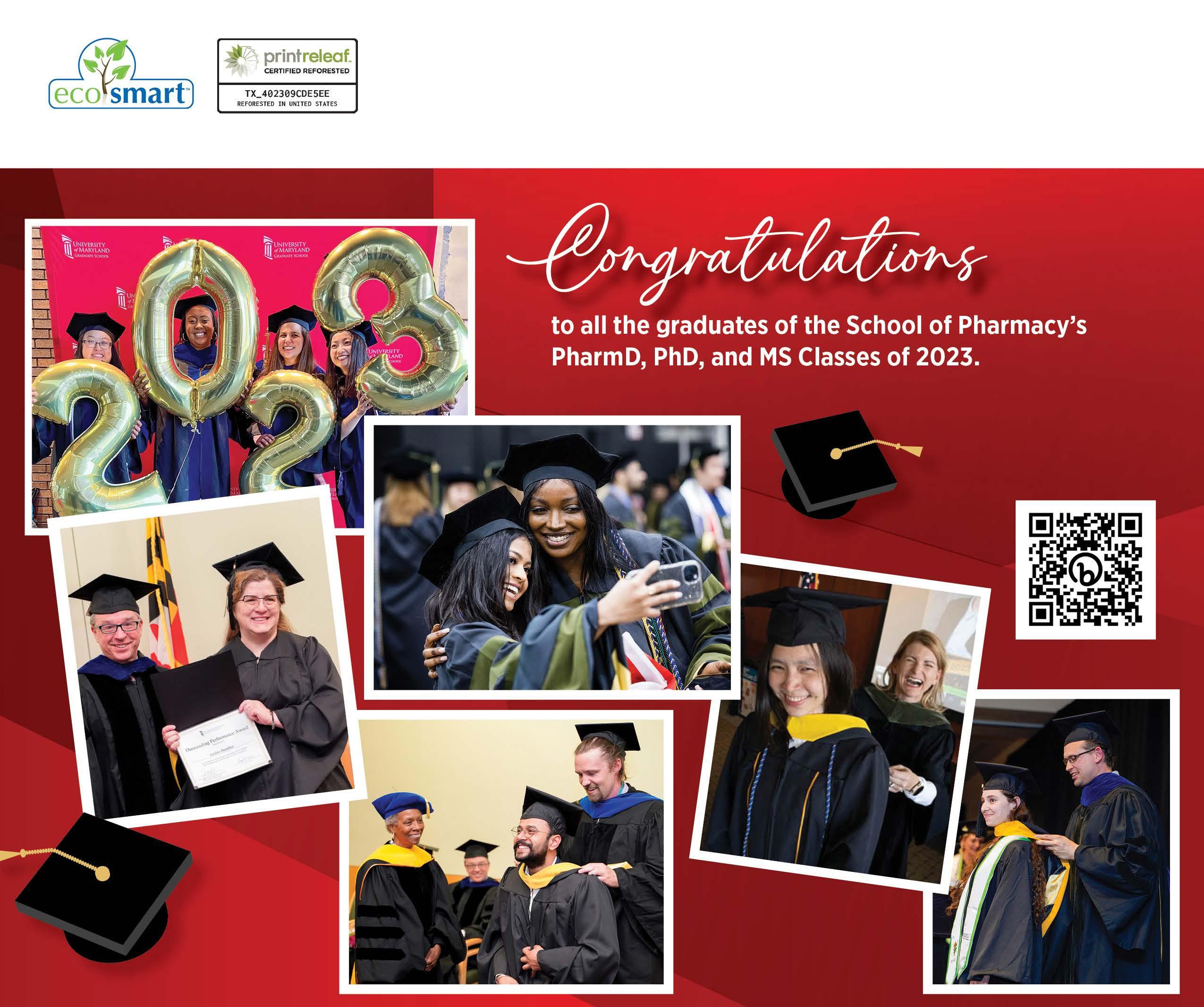RECOGNIZING AN

academic leader
When Natalie D. Eddington stepped down as dean this spring, it marked the end of a more than 15-year tenure spent in service to academic pharmacy filled with laudable accomplishments.







When Natalie D. Eddington stepped down as dean this spring, it marked the end of a more than 15-year tenure spent in service to academic pharmacy filled with laudable accomplishments.





In January, University of Maryland, Baltimore (UMB) President Bruce E. Jarrell, MD, FACS, announced my decision to step down from the deanship at the end of the 2022-2023 academic year. It was a difficult decision to make but one that I know is right for me and for this wonderful School.
I want you all to know how joyous and fulfilling the last 15 years as dean of the University of Maryland School of Pharmacy have been for me. It has been the pinnacle of my professional career to lead this amazing and historic institution.
When I walked into my new office on my first day as dean in August 2007, I was excited to get started and nervous about the enormity and importance of the role. But with the support, guidance, and compassion of many, many colleagues and collaborators and our faculty, staff, students, and alumni, I can say today that I am proud of all that we have collectively achieved in the last 15 years. So much of it is a direct result of your expertise, influence, and impact on our local and global community. While accomplishments, achievements, and accolades are wonderful to celebrate, what I most treasure are the connections I have made with each of you and all those I have worked with. As dedicated colleagues, as energetic students, and as impactful alumni and pharmapreneurs, each of you have enriched my time as dean and daily demonstrate the reach our School has in the city, state, country, and world.
I know that the School of Pharmacy’s legacy of excellence will continue, and I am honored to remain a part of this community of scholars, researchers, practitioners, and professionals as a faculty member and in my new role in the President’s Office. I will always be one of this School’s biggest cheerleaders and know that I, like you, remain committed to our mission, vision, and core values in this time of transition.
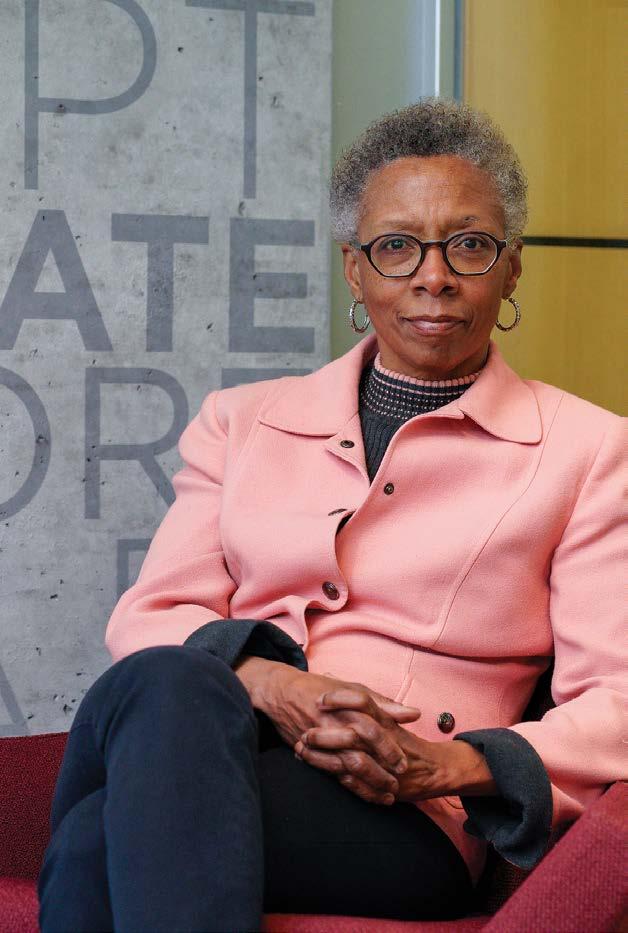
OUR MISSION:
The University of Maryland School of Pharmacy globally engages and leads education, pharmacy practice, scientific research, and pharmapreneurial initiatives to collaboratively and equitably improve the health of society.
OUR VISION:
The University of Maryland School of Pharmacy is internationally recognized for:
• empowering learners and graduating visionary leaders
• pioneering social impact and business innovation through pharmapreneurship
• listening to all voices to equitably enrich the lives of our internal and external communities
• positively influencing the delivery of convenient and affordable health care
• leveraging pharmaceutical expertise and relentlessly collaborating to solve scientific, clinical, and social problems that matter to all citizens of the world
OUR VALUES:
We embrace a culture that embodies the University of Maryland, Baltimore’s core values:
• Respect and Integrity: We value each other and hold ourselves accountable for acting ethically and transparently using compassion and empathy.
• Well-Being and Sustainability: We care about the welfare of our people, planet, communities, and University.
• Equity and Justice: We embrace and are committed to diversity, and we value inclusive and just communities. We oppose racism and oppression in all its forms.
• Innovation and Discovery: We imagine and explore new and improved ways to accomplish our mission of education, research, clinical care, and service.
Becky Ceraul, Capsule Editor
Assistant Dean, Communications and Marketing, School of Pharmacy
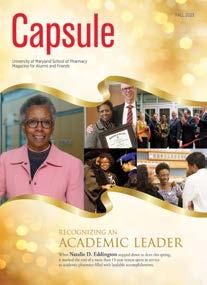
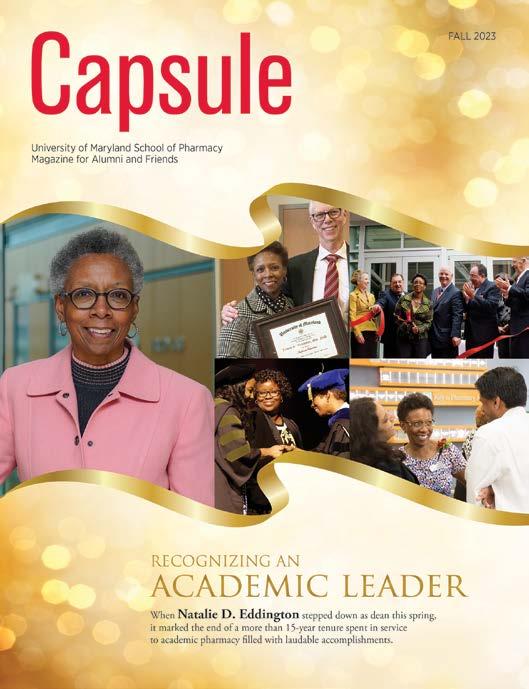
Chris Zang, Editor
Julie Bower, Assistant Director, Design Services University of Maryland, Baltimore
Office of Communications and Public Affairs
Special thanks to the following contributors: School of Pharmacy
Ken Boyden, JD, EdD Associate Dean
Development and Alumni Affairs
Greer Griffith, MS Executive Director Development and Alumni Affairs
Tae Kerney
Videographer/Photographer
Communications and Marketing
Liz Myers, MBA Lead Marketing Specialist
Communications and Marketing

Andrew Tie, MA Senior Web Content Specialist Communications and Marketing
We welcome your comments, news, and suggestions for articles. Send your ideas to Becky Ceraul at the University of Maryland School of Pharmacy, 20 N. Pine St., Room N302, Baltimore, MD 21201.
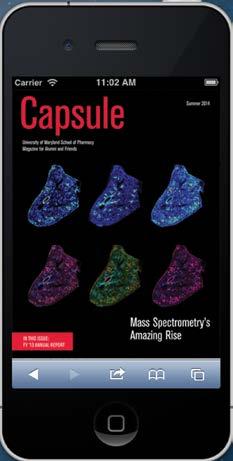
Email: rceraul@rx.umaryland.edu; Telephone: 410-706-1690; Fax: 410-706-4012.
Copyright © 2023 University of Maryland School of Pharmacy
pharmacy.umaryland.edu
(UMB) President Bruce E. Jarrell, MD, FACS, appointed Sarah L.J. Michel, PhD, professor and chair of the Department of Pharmaceutical Sciences (PSC) and associate dean for graduate programs, interim dean of the University of Maryland School of Pharmacy (UMSOP). Michel assumed her interim position on June 1 after Natalie D. Eddington, PhD ’89, FAAPS, FCP, stepped down the day before. Eddington has returned to her faculty role at the School and is leading UMB’s new EMBRACE initiative. Michel will serve as interim dean as a national search for the School’s next dean is conducted. A member of the UMSOP faculty for 18 years, Michel is an internationally recognized leader in the field of metals in medicine. Her work has been funded by the National Institutes of Health (NIH), the National Science Foundation (NSF), and U.S. Army Research labs for investigating the roles that metals play in the regulation of chronic inflammation, cancer, and neurodegenerative diseases. She also has been active in clinical research through Food and Drug Administration (FDA) grants, and she has been closely involved with the Maryland Center of Excellence in Regulatory Science and Innovation. A recent FDA clinical trial headed by Michel led the FDA to issue new guidance on how generic nanomedicines should be evaluated for approval. In addition, she is part of a PSC and School of Dentistry team of researchers funded by the FDA that is investigating the safety of electronic cigarettes.
During her time at the School of Pharmacy, Michel has been intricately involved in all of its educational aspects, including PhD and MS programs and the Doctor of Pharmacy (PharmD) program, where she redesigned the core biochemistry course to emphasize clinical applications to pharmacy and led the development of the PharmD research pathway. She has mentored dozens of PhD and PharmD students and has a keen understanding of the pharmacy profession, as well as the many roles and career opportunities for today’s School of Pharmacy students.
As an assistant professor, Michel developed “Spring into Maryland Science” with funding from the NSF to provide research experiences to students from groups under-represented in science. Directing the School’s PhD in PSC program, she was instrumental in partnering with the University of Maryland, Baltimore County’s Meyerhoff Program, which led to the successful application in 2022 of an NIH Initiative for Maximizing Student Development T32 grant to train students from groups under-represented in health-related sciences.
Her UMB contributions aren’t limited to the School of Pharmacy. Michel served as president of the UMB Faculty Senate from 2015 to 2017, where she worked with colleagues in the Staff Senate and Graduate Student Association, as well as UMB leadership, on the UMB Statement of Shared Governance. She also testified in the Maryland General Assembly on behalf of the UMB faculty on legislation that led to the formation of the MPower collaboration with the University of Maryland, College Park.
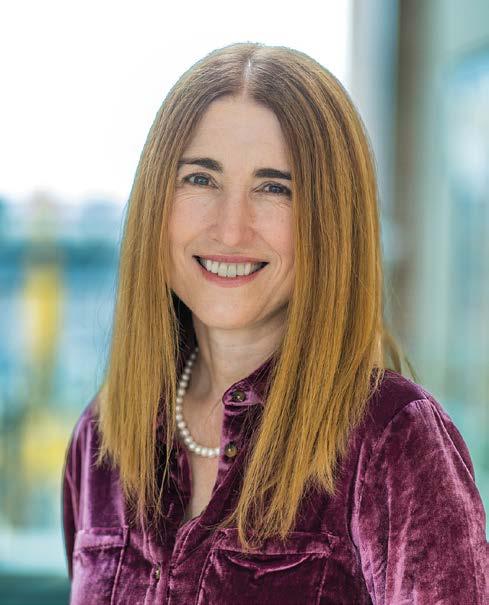
Michel received a BA in chemistry from Cornell University and a PhD in chemistry from Northwestern University. She completed an NIH National Research Service Award postdoctoral fellowship at the Johns Hopkins University School of Medicine.
The School of Pharmacy has merged two departments into the new Department of Practice, Sciences, and Health Outcomes Research (P-SHOR).
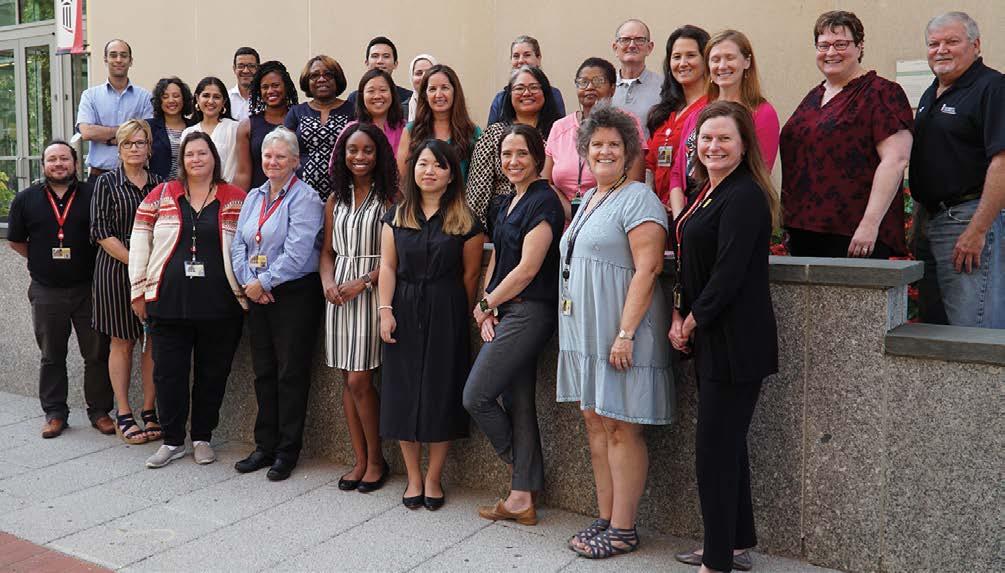
The departments of Pharmaceutical Health Services Research (PHSR) and Pharmacy Practice and Science (PPS), which were one department before 2003, have been rejoined to reflect their synergy and historical collaboration. The P-SHOR name was voted upon by faculty and staff after an opportunity to submit suggestions and the work of a small cross-departmental group that identified key words to reflect the joint expertise, influence, and impact of PHSR and PPS.
Continued on page 3
“The University of Maryland School of Pharmacy’s success and high-profile reputation have been positively influenced by PPS and PHSR and their research, academic, clinical, and outreach initiatives,” said then-Dean Natalie D. Eddington, PhD ’89, FAAPS, FCP, when announcing the merger in summer 2022. “This merger brings together many existing partners under one name and structure. I have long been impressed by the good work in both departments and expect continued growth and impact under P-SHOR.”
The new department’s shared projects and initiatives include the Peter Lamy Center on Drug Therapy and Aging, the Ellen
H. Yankellow Health Outcomes Fellowship, joint service on PhD dissertation committees, co-teaching of Doctor of Pharmacy courses, and funded grants that support faculty from both departments.
Jill Morgan, PharmD, BCPS, BCPPS, professor and chair of PPS, leads P-SHOR. C. Daniel Mullins, PhD, professor and chair of PHSR, remains on faculty as a professor and executive director of the renowned PATIENTS Program.
The PhD and MS in PHSR programs retain their names while now being administered by P-SHOR.
Research (P-SHOR), will help streamline the drug development process with its expertise in pharmacometrics.
Pharmacometrics measures and evaluates existing information on a given drug, a disease, and experiments, including clinical trials, to lay the groundwork for strategic decisions on drug regulation and/or drug development.
Three faculty members from the School of Pharmacy’s Center for Translational Medicine (CTM) are part of an ambitious research collaboration that aims to create an artificial, shelf-stable blood product.

This research endeavor is federally funded by a four-year, $46.4 million grant from the Defense Advanced Research Projects Agency (DARPA) and led by the University of Maryland School of Medicine (UMSOM). A synthetic blood product could potentially save thousands of lives, with applications including soldiers bleeding out in active war zones and trauma victims in remote locations.
“We have assembled an outstanding team to develop a bio-synthetic whole-blood product that can be freeze-dried for easy portability, storage, and reconstitution,” said study principal investigator (PI) Allan Doctor, MD, professor of pediatrics and director of the Center for Blood Oxygen Transport and Hemostasis at UMSOM. “It will be designed for easy use in the field by medics at the point of injury, and will perform like a traditional blood transfusion to, for example, stabilize a patient’s blood pressure or facilitate blood clotting.”
The School of Pharmacy is one of more than a dozen university and biotech company partners in this collaboration. CTM, which is part of the Department of Practice, Sciences, and Health Outcomes
“In the drug development process, there are stages of testing, first in the lab, then in animals, and finally in humans,” said Joga Gobburu, PhD, MBA, professor of P-SHOR, director of CTM, and a PI on the project. “The CTM faculty bring a wealth of expertise in optimizing the product and translating the findings across each stage. This is a complex product, and the translational science researchers will help design and analyze in vitro and in vivo experiments now so they will meet the clinical targets later in humans.”
Gobburu will oversee all quantitative aspects regarding statistical and scientific machine learning. A former top scientist at the Food and Drug Administration (FDA), he also will leverage his prior regulatory experience with drug development to assist the entire process with the goal of submitting an investigational new drug application with the FDA.

Other CTM faculty involved in the project include Mathangi Gopalakrishnan, PhD, MS, assistant professor of P-SHOR, who will be responsible for the statistical and pharmacometrics analysis and design, and Vijay Ivaturi, PhD, assistant professor of P-SHOR, who will apply scientific machine learning to guide the experimental design and interpretation of the data.
“The researchers from CTM play a vital role in this project,” Gobburu said. “We look forward to participating in this large project that will surely transform health care.”
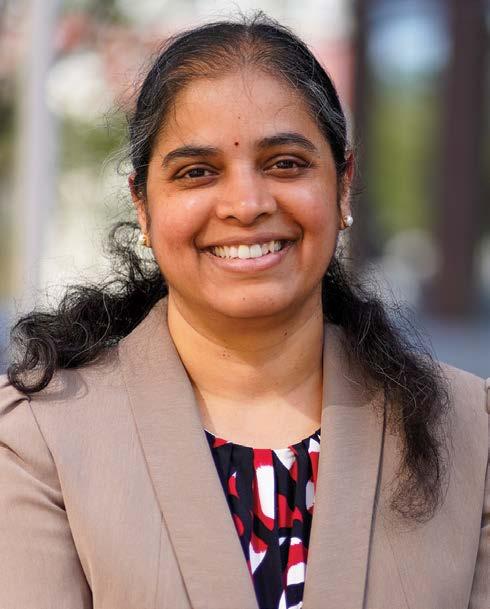 Joga Gobburu
Joga Gobburu
The National Institutes of Health has awarded a $1.1 million grant to the University of Maryland School of Pharmacy (UMSOP) and the University of Maryland School of Medicine (UMSOM) to create a training program to enhance diversity in the biomedical workforce.
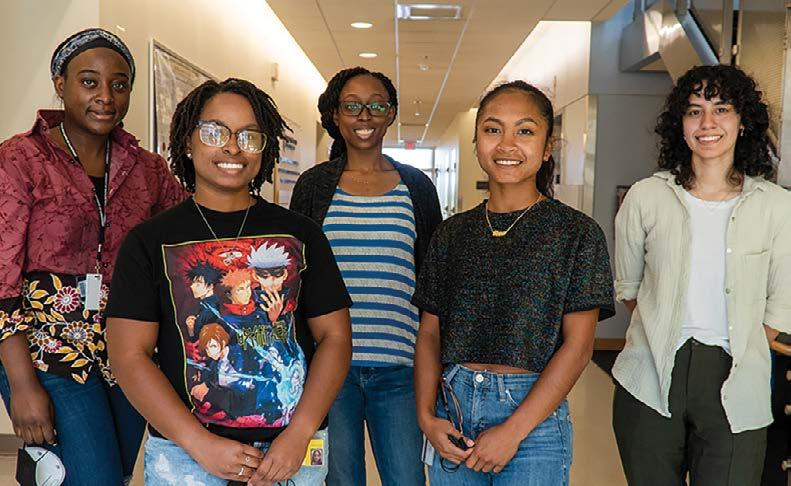
The five-year Initiative for Maximizing Student Development (IMSD) program strives to increase the number of students from under-represented groups in the doctoral programs in UMSOP’s Department of Pharmaceutical Sciences (PSC) and UMSOM’s Graduate Program In Life Sciences (GPILS).
The IMSD program’s goal is to train a diverse pool of PhD students across the biomedical research spectrum, which is why UMSOP and UMSOM are jointly hosting this program. Students will apply for admission to the graduate programs in PSC or GPILS. A team of faculty leaders from both schools will then select students for the IMSD training program, which will take 10 students per year — five in PSC and five in GPILS.
“This award is not only an opportunity to increase the platform for under-represented minorities on campus, but is also a chance to expose all our students to a diverse environment,” said Angela Wilks, PhD, the Isaac E. Emerson Chair of Pharmaceutical Sciences at UMSOP and one of four principal investigators (PI) of the grant. “We want to prepare our students to work in environments where
diversity, equity, and inclusion are hallmarks of whatever they do.”
Amanda Oglesby, PhD, associate professor of PSC at UMSOP, director of the PhD in PSC program, and another PI of the grant, said she wants to help build a biomedical workforce that looks more like its community and the country.
The IMSD grant aims to provide funding to address recruitment and retention gaps. It will cover first-year stipends for graduate students accepted into the program, conference travel, social events, and programming.
UMSOM also has two PIs on the grant, Dudley K. Strickland, PhD, associate dean for graduate and postdoctoral studies and professor of surgery, and Tonya J. Webb, PhD, assistant director for diversity, equity, and inclusion and associate professor of microbiology and immunology.
UMSOP and UMSOM are working collaboratively to develop the program’s content, which will be catered to the IMSD students, including workshops ranging from scientific writing to dealing with microaggressions to the various career tracks in the STEM fields. The grant is further supported by program administrators in each school — Kristina San Juan, MBA, at UMSOP and Sharron Graves, DBA, at UMSOM.
The IMSD program emulates and derives from the University of Maryland, Baltimore County’s Meyerhoff Program, a multiyear IMSD partnership with the University of Maryland, Baltimore.
The University of Maryland School of Pharmacy (UMSOP) ranks among the top 10 pharmacy schools in the country in funded research grants and contracts, according to new data from the American Association of Colleges of Pharmacy (AACP).
Fifty funded investigators helped the School place ninth with more than $25.8 million in research grants and contracts from the National Institutes of Health and other federal and non-federal sources. AACP’s ranking is based on data from Oct. 1, 2021, through Sept. 30, 2022.
UMSOP increased its research funding by more than $5 million between the 2021 and 2022 fiscal years. The School has shown year-over-year growth, with its number of funded faculty more than doubling and its total funding tripling in the last decade.
“The University of Maryland School of Pharmacy has outstanding faculty with creative and innovative ideas aimed at addressing basic biological questions, clinical problems, and
pharmaceutical health services gaps,” said Paul Shapiro, PhD, associate dean for research and advanced graduate studies and professor in the Department of Pharmaceutical Sciences (PSC). “The School’s funding portfolio is quite diverse, coming from both federal and non-federal sources.”
Faculty from PSC and the Department of Practice, Sciences, and Health Outcomes Research (P-SHOR) have earned contracts and grants for their groundbreaking research projects spanning drug discovery, translational medicine, population outcomes, and many more topics.
“Our dedicated faculty, researchers, and graduate students are committed to their pursuit of discoveries and innovation that will impact medicine, health care, and patient care,” said Sarah L.J. Michel, PhD, interim dean of the School and professor of PSC. “A top 10 ranking of our research funding is a recognition of the pursuit of scientific excellence that exists at our School.”

From using paper records and operating out of a basement of a building that is no longer on the University of Maryland, Baltimore (UMB) campus, to becoming a thriving solution-providing center, the Maryland Poison Center’s (MPC) five decades of service were celebrated in October 2022 with a reception and reflections on its storied history and influence.
“Today is a celebration of 50 years of the Maryland Poison Center at the University of Maryland School of Pharmacy [UMSOP],” said then-Dean Natalie D. Eddington, PhD ’89, FAAPS, FCP, as she welcomed current and former MPC staff, faculty, retirees, collaborators, local health officials, and UMB leadership to the celebration in Pharmacy Hall. MPC has been a free public service through UMSOP since 1972.
“That’s 50 years of serving the citizens of the state and managing poisoning or overdose emergencies,” Eddington said. “That’s 50 years of working with health care professionals to educate them on best practices in poisoning care. And that’s 50 years of educating the public about poison safety. I am tremendously proud of the impact the Maryland Poison Center has made in our state and proud that it is part of the University of Maryland School of Pharmacy community.”
When MPC joined UMSOP, it operated out of the basement of Dunning Hall, which was later demolished. The center was staffed by one person answering phones during the day and pharmacy and medical students who shared the responsibility during the evening and overnight hours. Call volume was around 10,000 annually.
Today, MPC operates out of a suite of offices in the Saratoga Building and manages more than 37,000 cases a year. MPC has answered about 2.5 million calls during the last 50 years from Marylanders dealing with a poisoning emergency. Serving 4.1 million Marylanders in 21 counties and Baltimore City, MPC is staffed 24 hours a day, 365 days a year by pharmacists and nurses who are
certified specialists in poison information (CSPI).
“We are lucky to have a poison center that has specially trained professionals to handle these situations and much scarier ones,” Eddington said. In addition to helping manage poisonings and overdoses around the clock, MPC provides education to health care providers and the community, saving health care dollars.
“The MPC is a service you hope to never need and are so relieved to find the experts there when you do,” said Jill Morgan, PharmD, BCPS, BCPPS, professor and chair, Department of Practice, Sciences, and Health Outcomes Research (P-SHOR).
MPC also analyzes cases in real time for trends and events that might be of public health significance, such as food poisoning, product recalls, and potential terrorism. In addition to CSPIs, the center’s staff consists of directors, a medical director, boardcertified clinical toxicologists, toxicology fellows, health educators, information technology support, and administrative staff.
While the free 24/7 telephone service is vital and what it’s most known for, the center conducts other activities as well, educating the public and health care students and professionals.
Reflecting on the center’s golden anniversary, MPC’s thenExecutive Director Bruce Anderson, PharmD, DABAT, FACCT, professor of P-SHOR who retired in June as professor emeritus, said, “It is remarkable. A half-century of service is just stunning to think about. It’s hard to wrap your head around.”
Across the decades, staffers shared one thing in common: not knowing what situation awaited them once they picked up the phone.
“It could be the mom with a little kid at home who was helping with laundry and just ate the Tide pod. Or it could be somebody calling about their elderly parent who may have mistaken their medications and taken three days’ worth of therapy at one time,” Anderson said.
The School of Pharmacy became the first in the state to train its student pharmacists on the administration of long-acting injectable medications as a result of changes to state regulations. In June 2022, a regulation was implemented that authorized pharmacists, with approved training from the Maryland Board of Pharmacy, to administer maintenance injectable medications in the community setting.
Third-year students in the School’s Abilities Lab 5 course received instruction in October 2022 on how to intramuscularly administer HIV, substance use disorder, and antipsychotic medications. Maryland now joins many other states in allowing pharmacist administration of these long-acting forms of medications.
The implementation of this new training into the School’s curriculum is the result of long-term advocacy from Department of Practice, Sciences, and Health Outcomes Research (P-SHOR) faculty members Megan Ehret, PharmD, MS, BCPP, Raymond Love, PharmD ’77, BCPP, FASHP, and Neha Pandit, PharmD, BCPS, AAHIVP, to state policymakers on the need for expanded pharmacist authority. Previously, the State of Maryland only allowed pharmacists to administer medications, such as insulin or
eyedrops, that a patient also could give to themselves.
“During the COVID-19 pandemic, many patients receiving regular long-acting injectable medications lacked easy access to them,” says Love, who retired as professor emeritus of P-SHOR in June. “Maryland’s new law allowing pharmacists to administer these injectable maintenance medications is the perfect solution. Community pharmacists are the most accessible health care professionals, and as they showed during the pandemic, can also serve as the most accessible providers to administer these medications.”
Adds Ehret: “Increasing access to medications is essential for Maryland’s citizens. These long-acting injectable medications are lifesaving, and at times, prescribers might not have offered these treatments due to administrative concerns. Now, patients can get these medications at local pharmacies as well as prescriber offices. I am very excited to train our students to be on the cutting edge of pharmacy practice.”
During the training, students learned how to properly administer these injections and assess administrative considerations.
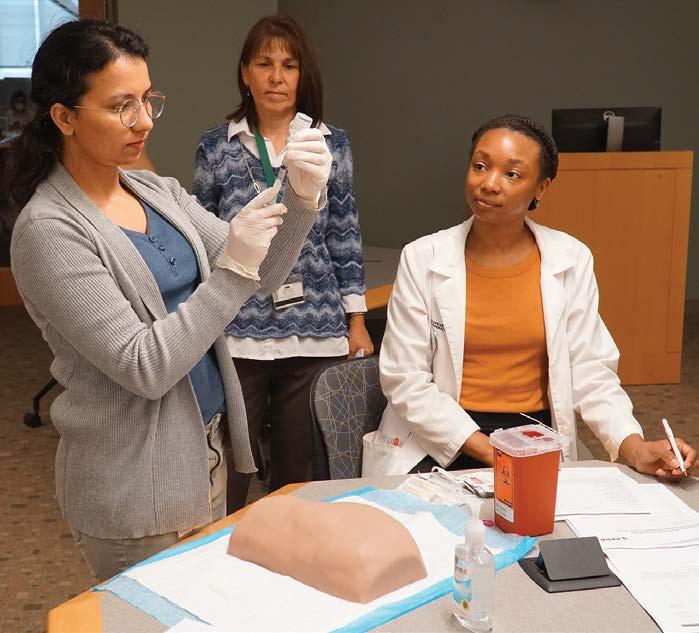
“As with any injectable medication or vaccine, it is essential to understand how to administer it correctly and safely,” says fourthyear PharmD student Gabrielle Jones. “Many of the medications have additional safety considerations, but this training ensures that pharmacists are appropriately educated on handling them. I am excited that I can provide patients with expanded access to their medications now.”
Paul Shapiro, PhD, professor in the Department of Pharmaceutical Sciences (PSC), has been named the School of Pharmacy’s associate dean for research and advanced graduate studies. He succeeds Peter Swaan, PhD, who became dean of the University of Florida College of Pharmacy in December.
In his new role, Shapiro will work to enhance the impact of the School’s research enterprise by increasing the number of funded
investigators and by building interdisciplinary collaborations. He also will work with the directors of the PhD in PSC and the PhD in Pharmaceutical Health Services Research programs. Shapiro previously served as the School’s associate dean for research and graduate studies from 2009 to 2011.
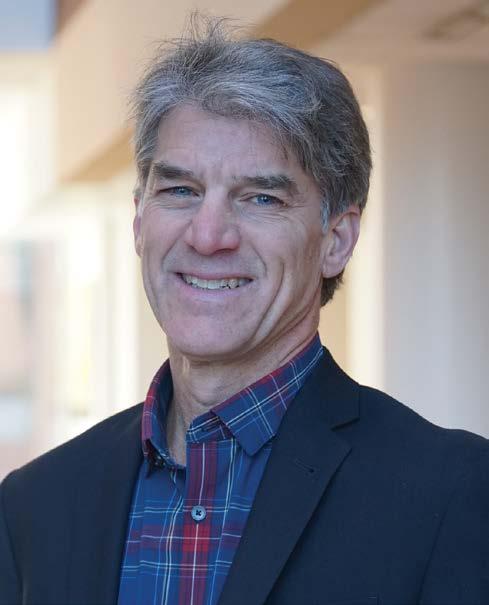
A faculty member since 1999, Shapiro received his Bachelor of Science from the University of Wisconsin-Madison and his PhD in molecular physiology and biophysics from the University of Vermont. He completed postdoctoral training in the Department of Chemistry and Biochemistry at the University of Colorado-Boulder.
His research focuses on developing new approaches to selectively regulate mitogen activated protein (MAP) kinases involved in promoting cancer cell proliferation and tissue injury due
Continued on page 7
Continued from page 6
to inflammation. Specific areas of research are the discovery and development of novel small molecules that inhibit the extracellular signal-regulated kinases (ERK1/2) and p38 MAP kinases and provide the rationale for clinical applications of these molecules in treating cancer or inflammatory disease. He holds three patents for his discoveries.
The School of Pharmacy has more than $38.5 million in grants and contracts, with more than $7.1 million of that funding from the National Institutes of Health. It is ranked by the American Association of Colleges of Pharmacy as ninth in research out of more than 140 schools.
“I am honored to serve again as associate dean,” Shapiro says.
“My goals are to support faculty in obtaining research grants and contracts, to work with our two departments and external partners to optimize graduate student and postdoctoral fellow training that meets workforce needs, and to work with other University of Maryland, Baltimore schools to identify and promote collaborative research opportunities.”
His other leadership roles have included director of PSC’s PhD program and department chair from 2015 to 2020. He has extensive service on numerous departmental and School committees, in addition to mentorship of PharmD and PhD students and postdoctoral fellows.
Sandeep Devabhakthuni, PharmD, BCCP, associate professor in the Department of Practice, Sciences, and Health Outcomes Research (P-SHOR), has been named associate dean for student affairs. He succeeds Cherokee LaysonWolf, PharmD ’00, BCGP, BCACP, FAPhA, professor of P-SHOR, who returned to her full-time faculty position after 10 years as associate dean.
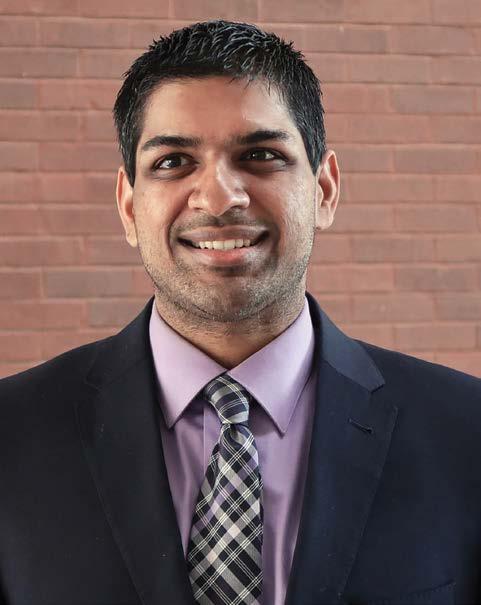
“Serving as associate dean for student affairs was always a professional goal of mine,” says Layson-Wolf. “I thank former Dean Eddington, Dr. Jill Morgan, and Dr. Magaly Rodriguez de Bittner for their support for the past 10 years. I value my close interactions with student pharmacists, student organization leaders, and our faculty and staff and am grateful to have been able to serve the School of Pharmacy in this capacity. I am forever indebted to the many members of the School of Pharmacy community who have worked to support our students and thank my colleagues in the Office of Student Affairs and our collaborators in the Office of Academic Affairs who have worked together to support all aspects of the student experience.”
As an associate professor, Devabhakthuni’s practice and research interests include sedation in critically ill patients and appropriate use of cardiovascular medications. From 2016 to earlier this year, he was director of postgraduate training for the University of Maryland Residency and Fellowship program. A clinical pharmacy specialist at the University of Maryland Medical Center, he practices in the areas of advanced heart failure and cardiac transplantation.
In 2015, Devabhakthuni co-founded the Applied Therapeutics, Research, and Instruction at the University of Maryland (ATRIUM) collaborative, which is dedicated to managing patients with cardiovascular disease. He has published more than 30 peerreviewed articles and three book chapters and delivered more than 50 national oral and poster presentations. He is a past president of the Maryland Society of Health-System Pharmacy (MSHP) and a past chair for the American Society of Health-System Pharmacists’ (ASHP) Section of Inpatient Care Practitioners’ Educational Steering Committee.
He is a current member of the ASHP Council on Education and Workforce Development. He is a recipient of MSHP’s 2013 Pharmacist of the Year Award, the University of Maryland 2016 Residency and Fellowship Preceptor of the Year Award, the School of Pharmacy’s Classes of 2018 and 2020 Teacher of the Year Award, and the University of Pittsburgh School of Pharmacy Rising Star Award in 2021.
Devabhakthuni received his Bachelor of Science in biomedical engineering from the University of Pittsburgh School of Engineering and a Doctor of Pharmacy from the University of Pittsburgh School of Pharmacy. He completed a PGY-1 pharmacy practice residency at the University of Maryland Medical Center and a cardiology/critical care specialty residency at the University of Pittsburgh Medical Center. He is a board-certified pharmacotherapy specialist in cardiology.
“I am honored and excited for this opportunity,” says Devabhakthuni. “Since the beginning of my academic career, I have enjoyed working with students and helping them achieve their career goals post-graduation. I plan to be an advocate for our students and ensure that they receive the best education possible.”
The following School of Pharmacy faculty members received promotions.
• Bruce Anderson, PharmD, DABAT, FAACT – professor of practice, sciences, and health outcomes research (P-SHOR) to professor emeritus
• Cynthia Boyle, PharmD ’96, FAPhA, FNAP, FASCP – professor of P-SHOR to professor emeritus
• Emily Heil, PharmD, MS, BCIDP, BCPSAQ ID, AAHIVP – associate professor of P-SHOR to professor
• Maureen Kane, PhD – associate professor of pharmaceutical sciences (PSC) to professor with tenure
• Cherokee Layson-Wolf, PharmD ’00, BCGP, BCACP, FAPhA – associate professor of P-SHOR to professor
• Raymond Love, PharmD ’77, BCPP, FASHP – professor of P-SHOR to professor emeritus
• Edward Moreton, PhD – professor of PSC to professor emeritus
• Zachary Noel, PharmD, BCCP, BCPS – assistant professor of P-SHOR to associate professor
• Ebere Onukwugha, PhD, MS – associate professor of P-SHOR to professor with tenure
• Francis Palumbo, PhD, JD, MS –professor of P-SHOR to professor emeritus
• Neha Pandit, PharmD, BCPS, AAHIVP – associate professor of P-SHOR to professor
• Danya Qato, PhD, PharmD, MPH – assistant professor of P-SHOR to associate professor with tenure
• Marc Taraban, PhD – assistant research professor of PSC to associate research professor
• Ester Villalonga Olives, PhD, MsC – assistant professor of P-SHOR to associate professor with tenure
• Jia Bei Wang, PhD ’92 – professor of PSC to professor emeritus
• Chanel Whittaker, PharmD, BCGP, FASCP – associate professor of P-SHOR to professor
Angel Bivens, BS Pharm, MBA, CSPI, has been named director of operations and public education at the Maryland Poison Center (MPC).
Wendy Camelo Castillo, PhD, MD, MSc, has been named director of the Pharmaceutical Health Services Research Graduate Program.
Kimberly Claeys, PharmD, BCPS, received the Society of Infectious Diseases Pharmacists’ 2022 Early Career Investigator Recognition and the Maryland Society of Health-System Pharmacy’s (MSHP) 2022 Pharmacist of the Year Award.
Heather Congdon, PharmD, CACP, BCPS, CDE, received a continuance of the University System of Maryland Wilson H. Elkins Professorship for 2022-2023.
Andrew Coop, PhD, has been named interim associate dean for graduate programs.
Sandeep Devabhakthuni, PharmD, BCCP, received the Rising Star Award from the University of Pittsburgh School of Pharmacy’s Alumni Society Board.
Bethany DiPaula, PharmD ’95, BCPP, FASHP, received the 2023 Pharmacists Advocate Award from the Maryland Pharmacists Association (MPhA).
Susan dosReis, BSPharm, PhD ’99, has been appointed to the Patient-Centered Outcomes Research Institute’s Standing Reviewer Board.
Alison Duffy, PharmD, BCOP, received MPhA’s 2023 Excellence in Innovation Award.
Steven Fletcher, PhD, has been named director of the School’s MS in Pharmaceutical Sciences program.
Joga Goburru, PhD, MBA, has been named to the University of Maryland, Baltimore’s (UMB) Digital Health Advisory Board. He and Vijay Ivaturi, PhD, received a U.S. patent for “Method of Administering Sotalol IV/Switch.”
Mathangi Gopalakrishnan, PhD, MS, was named a fellow of the American College of Clinical Pharmacology (ACCP).
Mojdeh Heavner, PharmD ’08, BCPS, BCCCP, received an Editor’s Choice Award from the journal Pharmacotherapy and was reappointed to a three-year term as an associate editor for the American Journal of Health-System Pharmacy
Emily Heil, PharmD, MS, BCIDP, BCPS-AQ ID, AAHIVP, and Neha Pandit, PharmD, BCPS, AAHIVP, received UMB’s President’s Global Impact Fund Award.
Amy Howard, PharmD ’17, has been elected to the board of directors of the MPhA Foundation.
Vijay Ivaturi, PhD, was named presidentelect of the International Society of Pharmacometrics.
Amy Ives, PharmD, BCPS, was named the School of Pharmacy’s 2023 American Association of Colleges of Pharmacy (AACP) Teacher of the Year.
Seferina Kim, PharmD ’09, BCPS, received certification as an anticoagulation provider.
Lisa Lebovitz, JD, MS ’21, was a member of the team that received the 2023 AACP Assessment Special Interest Group Collaborative Publication Award.
Jimmy “James” Leonard, PharmD, DABAT, has been named director of clinical services at MPC.
Mary Lynn McPherson, PharmD ’86, MA, MDE, BCPS, received UMB’s Leaders in Education: Academy of Presidential Scholars Award for Distinguished Mentor. She also received the 2023 Fudin Award for Pain and Palliative Care Mentorship from the Society of Pain & Palliative Care Pharmacists Foundation.
Zachary Noel, PharmD, BCCP, BCPS, received the Medication Safety Award from MSHP and the Junior Investigator Award from ACCP's Cardiology Practice and Research Network.
Amanda Oglesby, PhD, has been named director of the School’s PhD in PSC program.
Emily Paterson, MPH, BS, CHES®, was elected co-chair of America’s Poison Centers’ Public Education Advisory Council.
Kathleen “Katy” Pincus, PharmD ’09, BCPS, received certification as a diabetes care and education specialist.
James Polli, PhD, received the American Association of Pharmaceutical Scientists’ 2022 Global Leader Award.
Danya Qato, PhD, PharmD, MPH, received the University of Maryland School of Medicine’s Department of Epidemiology Faculty Teaching Award.
Leah Sera, PharmD ’10, MA, BCPS, has been appointed by Maryland Gov. Wes Moore to the Maryland Department of Health’s Cannabis Public Health Advisory Council.
Fadia Shaya, PhD, MPH, has been named a UMB Distinguished University Professor.
Julia Slejko, PhD, was appointed to ISPOR’s (The Professional Society for Health Economics and Outcomes Research) Health Science Policy Council and was named to the editorial board of the journal Applied Health Economics and Health Policy
Paul Solinsky, PharmD, BCACP, was appointed to the Pharmacy Quality Alliance’s COPD Treatment Ratio Measure Development Technical Expert Panel and received a Maryland Patient Safety Center 2023 Minogue Award for Patient Safety Innovation.
Audra Stinchcomb, PhD, was named a fellow of the American Institute for Medical and Biological Engineering.
Deanna Tran, PharmD ’11, BCACP, FAPhA, was appointed to AACP’s PioneerRx Workgroup. She also received the National Community Pharmacists Association Pharmacy Leadership Award, given by MPhA and was named a fellow of the American Pharmacists Association.
James Trovato, PharmD, MBA, BCOP, FASHP, was appointed to the Accreditation Council for Pharmacy Education’s Continuing Pharmacy Education Provider Accreditation Commission.
Ester Villalonga Olives, PhD, MsC, was appointed to the French National Cancer Institute’s Health and Social Sciences and Public Health Scientific Committee.
Fengtian Xue, PhD, was named the School’s 2023 Faculty Preceptor of the Year and was voted president-elect of the School’s Faculty Assembly.
Hongbing Wang, PhD, and Angela Wilks, PhD, have been named interim co-chairs of the Department of Pharmaceutical Sciences.
When Natalie D. Eddington stepped down as dean this spring, it marked the end of a more than 15-year tenure spent in service to academic pharmacy filled with laudable accomplishments.
BY CHRISTIANNA MCCAUSLANDearly 16 years ago, Natalie D. Eddington was annoyed. At the time, former University of Maryland, Baltimore (UMB) President David J. Ramsay, DM, DPhil, was looking for a new dean for the School of Pharmacy. Eddington, who earned her PhD from the School in 1989, the first female African American to do so, had returned to her alma mater in 1991 to join the faculty in the Department of Pharmaceutical Sciences (PSC) after two years at Pfizer. Having risen to department chair of PSC in 2003, Eddington wanted to be on the committee selecting the next dean and could not understand why the president hadn’t accepted her request to join. She went to give him a piece of her mind, and he delivered a piece of news.

“He said, ‘I want you to throw your hat in the ring,’” she recalls. “That’s how this started. It wasn’t that I aspired to be a dean. But when someone you admire sees something in you, I think you need to find out what that is.”
When Eddington emerged as the best candidate after a national search in August 2007, she became UMB’s first female African American dean. When she stepped down at the end of May 2023, it ended her time as the current longest-serving dean at UMB. During her tenure, she navigated the School of Pharmacy through challenging times including an economic recession, a global pandemic, and a downward national trend in pharmacy school enrollment.
Yet the School is stronger than ever, currently ranked 14th out of more than 140 schools of pharmacy by U.S. News & World Report. Within her first five years, Eddington oversaw a major revision of the Doctor of Pharmacy (PharmD) curriculum and the expansion of the PharmD program to the Universities at Shady Grove (USG), opened the seven-story, $62 million Pharmacy Hall Addition, expanded research efforts, and built bridges among peer academic institutions, federal agencies, and local and national legislators.
“She’s an exemplary dean who understands her priority is to be an advocate for her school,” says Jay A. Perman, MD, chancellor of the University System of Maryland and former president of UMB.

researcher, and so it made sense that if medicine and pharmacy were going to forge a close relationship, having the dean as a researcher herself would enhance the relationship that already existed between the two schools,” says Reece, a fellow researcher. In fact, extramural funding at the School of Pharmacy nearly quadrupled during Eddington’s time as dean to more than $25.9 million and 50 funded faculty by September 2022, resulting in a national ninth-place ranking by the American Association of Colleges of Pharmacy (AACP). Including contracted and clinical services, the School generated a total of $38.5 million in 2022.
Before she could grow any of her programmatic plans, one of Eddington’s first efforts as dean was to strongly advocate for the Maryland General Assembly to allocate funding for the building of Pharmacy Hall Addition. Ellen H. Yankellow, BSP ’73, PharmD ’96, president and CEO of Correct Rx Pharmacy Services, says that while people take the building for granted today, it took a years-long advocacy effort to bring it to construction. “It was an important step for the School of Pharmacy and catapulted it forward, making a better environment for training pharmacists and researchers and creating new academic programs.”
Yankellow attended the ribbon-cutting for the new building in 2010. Eddington’s commitment to seeing the new building opened impressed Yankellow. “I was very proud to be with her that day when the 128,000-square-foot building was dedicated,” she says.
Albert Reece, MD, PhD, MBA, former executive vice president of UMB, former dean of the University of Maryland School of Medicine, and currently an endowed professor and director of the medical school’s Center for Advanced Research Training and Innovation, was chair of the search committee when Eddington was under consideration.
“It didn’t take long to realize she was the right person,” he recalls. Reece says she was personable, humble and had good insights, but he appreciated her as a scientist. Over the years, the two schools have had many successful collaborations, particularly in the area of drug development.
“The medical school is research intensive, and Natalie is a
“The fact that she was a woman — unusual at the time — was not lost on me,” Yankellow continues. “It was nice to see a woman nationally recognized as a thought leader, and she set the bar high for other women in pharmacy and science to follow. She really showed there are no limits for what women can achieve, both in academia and in our profession.”
A hallmark of Eddington’s time as dean was her desire to move the pharmacist from the traditional, behind-the-counter dispensing role to one of greater prominence and impact, often through innovative programs. Bruce E. Jarrell, MD, FACS, current president of UMB, has worked with Eddington on a number of academic programs, most notably new master’s programs at USG. “She’s very facts-driven,” says Jarrell, “She’s always the one to say, ‘Show me the data and then let’s figure out where we’re going to go.’”
At Shady Grove, the time was right in the mid-2000s for the
School of Pharmacy to explore innovative modes of delivery to engage prospective pharmacy students. So, in fall 2007, the School opened its program at USG, with an additional 40 students per year based there, complementing the 120 students per year in Baltimore. The expansion to USG also saw the implementation of online academic delivery, revolutionary for its time and a format that would prove prescient years later when COVID-19 caused schools to pivot to virtual learning.
“Shady Grove helped us understand you don’t need to be in the same room to learn,” says Eddington. “One thing about higher education is that it’s important that faculty and students not get complacent. Everything we do needs to focus on learning. Shady Grove helped us change the way we looked at pharmacy education.”
Jarrell notes that while Eddington is data-driven, she also has a strong intuition. “The School had a very strong program at Shady Grove, but as the tea leaves became clear to [Eddington] and she foresaw lower enrollment, we were able to downsize that program together.”
Fluctuations in national pharmacy school enrollment have marked all of Eddington’s years at the School. Her ability to be nimble and responsive enabled the School to retain students while other institutions struggled. “The challenge is that there was an increase in the number of schools of pharmacy that was not in tune with the needs of the workforce,” says Perman. “Natalie saw that coming and made adjustments in capacity. She’s very good at anticipating workforce needs.
“I admire her for what she’s put into place,” Perman continues. “She put centers into place like the Bio- and Nano-technology Center and the Mass Spectrometry Center; wherever I go around the country I always talk about the PATIENTS Program set up under her leadership, which is a model of engaging a community that often feels it’s the subject of research and is now a partner in the research.”
While other schools doubled down on their PharmD programs, Eddington innovated by starting new master’s-level programs, most notably the nation’s first-ever Master of Science (MS) in Medical Cannabis Science and Therapeutics, which, along with the MS in Pharmaceutical Sciences, is housed at USG. During her time, the
School has grown from three academic programs in 2007 (PharmD and two PhDs) to 10 today, which includes a variety of master’s degrees crafted to respond to industry need.
“Higher education can’t develop programs to last for 50 years; they have to listen to students and continually develop content that will support what learners want and need for their careers now,” says Eddington.
To achieve this, the School needed innovative curricular offerings and state-of-the-art facilities designed to teach students how to practice pharmacy in a rapidly changing world. Time and again, Eddington displayed creativity and innovation.
“The thing I appreciate the most is that she’s so willing to think out of the box,” says John Gregory, BSP '76, DPS (Hon.) '02, president and CEO of Gregory Pharmaceutical Holdings, Inc. “Look at Pharmapreneurism™. Not only did she create that, she also trademarked the name — she was thinking like a pharmapreneur.”
Gregory explains that “there’s always been a desire among pharmacists and students to improve their education, and she’s giving them better opportunities beyond ‘count-and-pour’ through the pharmapreneurism program.”
Ralph “Rick” Shangraw Jr., PhD, president of Cintana Education, comes from a long line of pharmacists including his father who was on faculty at the School. He says Eddington reached out to him, and pharmapreneurism was an area where they connected.
“Being a pharmacist had become more of a commodity job and she said, ‘We have to bring luster back to the profession,’” says Shangraw. “Introducing this intersection of entrepreneurship with pharmacy was just brilliant because entrepreneurship is, by nature, exciting. Linking it with pharmacy has introduced a new excitement, and she’s really been the champion of that.”
ddington’s advocacy for pharmacy education went well beyond UMB, too, says Robert Beardsley, PhD, MS, professor emeritus of practice, sciences, and health outcomes research. “She served as the chair of the AACP

Council of Deans and also on AACP's board of directors,” he states. “I was impressed with her leadership skills and the energy that she brought to these important positions. She is a national leader in and an advocate for pharmacy education.”
She’s also closely aligned with the needs of her students. Sean M. Kim, PharmD ’23, says this became obvious during the pandemic when he was president of the School’s Student Government Association. “Her unwavering commitment to our students' well-being during the pandemic was truly remarkable, as she checked in with me regularly to get the pulse of the student body,” he says. “As a result, I had the privilege of observing and learning how she expertly brought together different groups — faculty, students, and staff — for the betterment of our School.”
Those who work with Eddington, and the former dean herself, say that while she is thoughtful, a good listener, and a fine collaborator, she’ll also push the envelope. “The reason I’ve been successful is I’m not afraid to do things, but if I make mistakes, I’ll share that,” she explains. “I listen, I ask people to tell me what’s wrong, and I take suggestions.”
Nowhere has she been more creative — or more successful — than in fundraising. Recalls Gregory: “The School is constantly developing its own funding so it can create its own future.”
Stephen Allen, RPH, MS ’78, FASHP, chair of the School’s Board of Visitors, has known the former dean for 15 years. He sought her out at an American Society of Health-System Pharmacists event and found her warm, sincere, energetic, and optimistic. He seized the opportunity to share that he felt the School needed to reach out more to its alumni. She took the suggestion to heart and brought him onto the School’s Board of Visitors. He explains that improved engagement with alumni has been essential to securing the School’s financial freedom.
“She and Ken Boyden [associate dean for development and alumni affairs] have recognized some of the most successful graduates, put on a fabulous event to honor those individuals, and most of them have made significant commitments to the School with endowed gifts,” he explains. “That has been huge for the School; it helps lift its overall reputation and it helps because alumni can see the good things happening at the School.”
A shining example is Ellen Yankellow, who has made several significant gifts to the School, including the largest gift ever from a female graduate that resulted in the naming of the Grand Atrium in Pharmacy Hall in her honor. She says that Eddington understands that philanthropists “give to people, not the institution,” and states that but for Eddington’s leadership and friendship, much of her large gift-giving may never have happened.
Although she has stepped down as dean, Eddington is not retiring. She’s taken a leadership role in UMB’s new EMBRACE Initiative, aimed at improving vibrancy on the UMB campus and expanding that into community impact in West Baltimore.
“We are looking at the communities around the campus, how we can better serve them and how we can make our campus and its surroundings more welcoming,” Jarrell explains. “I’m hoping she will bring to this venture ways to measure our impact so we can talk about our successes in a data-driven manner, using her creativity to community-build.”
As she leaves the deanship, Eddington hopes the next dean will build on her foundation and make the School even better. “Better in terms of growing our research, creating new programs, and figuring out what academic pharmacy will look like in the next 10 years,” says Eddington.
Many things could define Eddington’s legacy: a building, a unique cannabis academic program, centers for translational research, mass spectrometry and drug development. But Yankellow says Eddington is more than the sum of her accomplishments.
“Her legacy won’t be just one thing,” she says. “She is an understated leader who leads by example in a way that makes people want to follow her. Her legacy is her courage and ability to adjust to the profession’s needs and do the right thing for the School when it’s needed.”

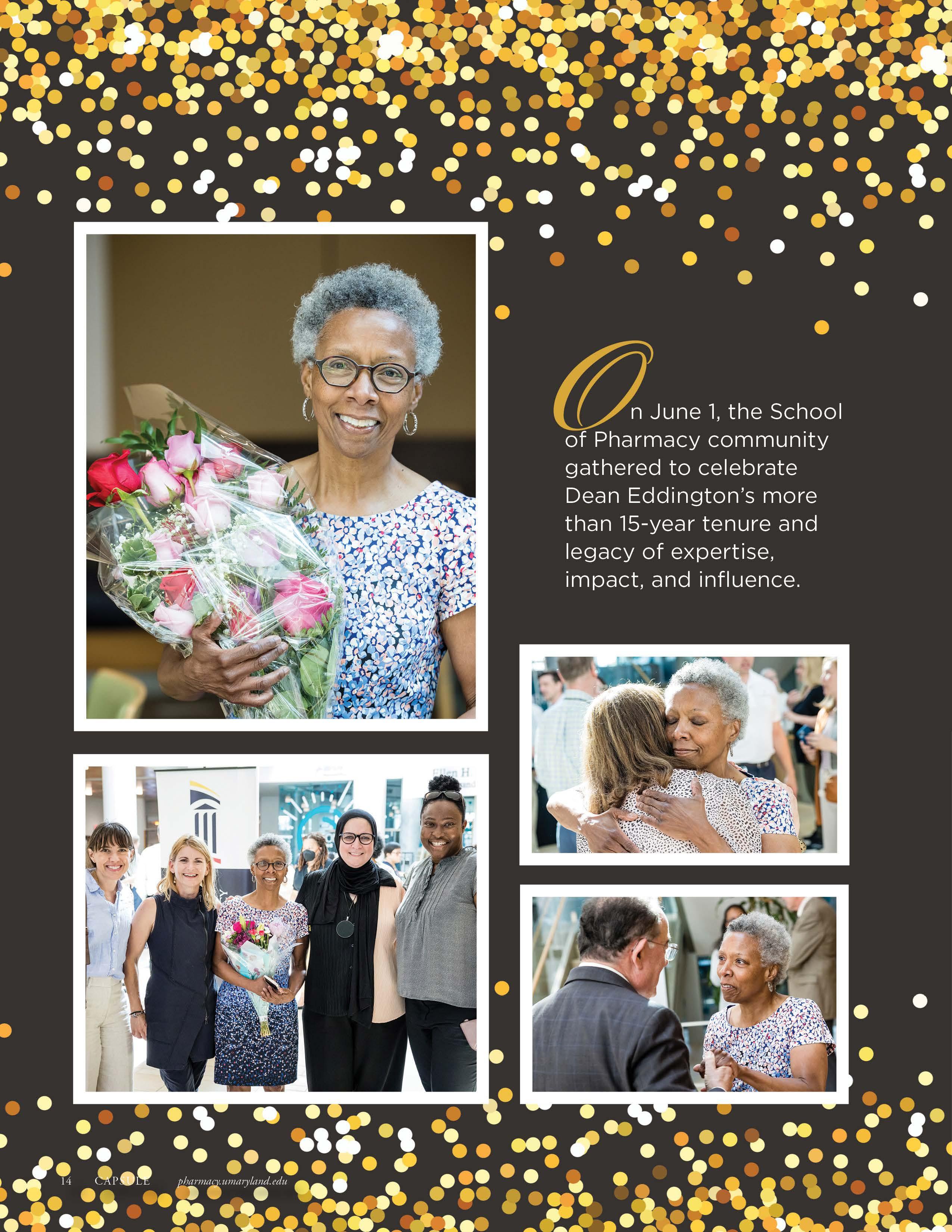
The deanship of Natalie D. Eddington, PhD ’89, FAAPS, FCP, has been a transformative period for the University of Maryland School of Pharmacy.
In honor of Eddington’s 15-year tenure as dean, Ellen H. Yankellow, BSP ’73, PharmD ’96, president and CEO of Correct Rx Pharmacy Services, announced a $500,000 gift to the School during the celebration for Eddington on June 1.
Yankellow is one of the School’s Founding Pharmapreneurs, a member of the Board of Visitors, and namesake of the Ellen H. Yankellow Grand Atrium in Pharmacy Hall.
“When people ask me ‘why do you give to the School of Pharmacy?’ the answer is simple, people give to people they trust,” Yankellow said. “Trust is earned, and Natalie earned my trust along with that of so many others that our gifts would be used wisely and impactfully.”
The gift will be used for five initiatives at the School and University.
• $100,000 over three years to the Peter Lamy Center on Drug Therapy and Aging to support a training fund for residents, fellows, and students.

• $100,000 over three years to provide scholarship support for students from under-represented communities within the Master of Science in Regulatory Science program.
• $100,000 over three years to support the Center for Innovative Pharmacy Solutions telehealth program in its leading collaboration with other University of Maryland, Baltimore (UMB) schools.
• $100,000 over three years to provide student support in the PhD in Pharmaceutical Sciences (PSC) program and its National Institutes of Health-awarded Initiative for Maximizing Student Development program, which strives to increase the number of students from underrepresented groups in the PSC doctoral program.
• $100,000 over three years to provide support for UMB’s new EMBRACE Initiative, a multi-faceted approach designed to increase the vibrancy of the greater UMB campus, boost UMB’s community impact in West Baltimore, and strengthen UMB’s profile with its internal and external constituencies.
Eddington has accepted a leadership role in EMBRACE.
If you wish to join us in honoring former Dean Eddington by making a gift to the Annual Fund in her honor, please visit pharmacy.umaryland.edu/go/capsule or mail a check payable to UMBF Inc. to:
Office of Gift Administration
220 N. Arch Street, 13th Floor Baltimore, MD 21201









SOP task force transforms input into vigorous initiative to advance equity, diversity, and inclusion.
BY CHRISTINE STUTZrobust initiative to advance equity, diversity, and inclusion (EDI) at the University of Maryland School of Pharmacy is well under way, about three years after a task force was established. Led by Wendy Camelo Castillo, PhD, MD, MSc, assistant professor of practice, sciences, and health outcomes research (P-SHOR), Amanda Oglesby, PhD, associate professor of pharmaceutical sciences (PSC), and Chanel Whittaker, PharmD, BCGP, FASCP, professor of P-SHOR, the 22-member task force, with representation from students, faculty, and staff, recommended priorities for bold initiatives benefiting the entire community.

In a final report, the task force recommended several priorities for the School, including:
• community building
• community competence



















• community equity and accountability
• community inclusion
“This journey with EDI began in 2020, when a lot of organizations across industries were responding to structural racism and inequities that were brought to light by the COVID-19 pandemic and the killing of George Floyd,” says Whittaker. The pharmacy profession, academia, and former

School of Pharmacy Dean Natalie D. Eddington, PhD ’89, FAAPS, FCP, put out statements calling upon the pharmacy community “to address new ways to eliminate health inequities and pursue a healthy future for all regardless of identity or social position,” Whittaker says.
A focus on “inclusive excellence” is taking shape under the leadership of Whittaker, who was named the School’s inaugural assistant dean for EDI in May 2022.

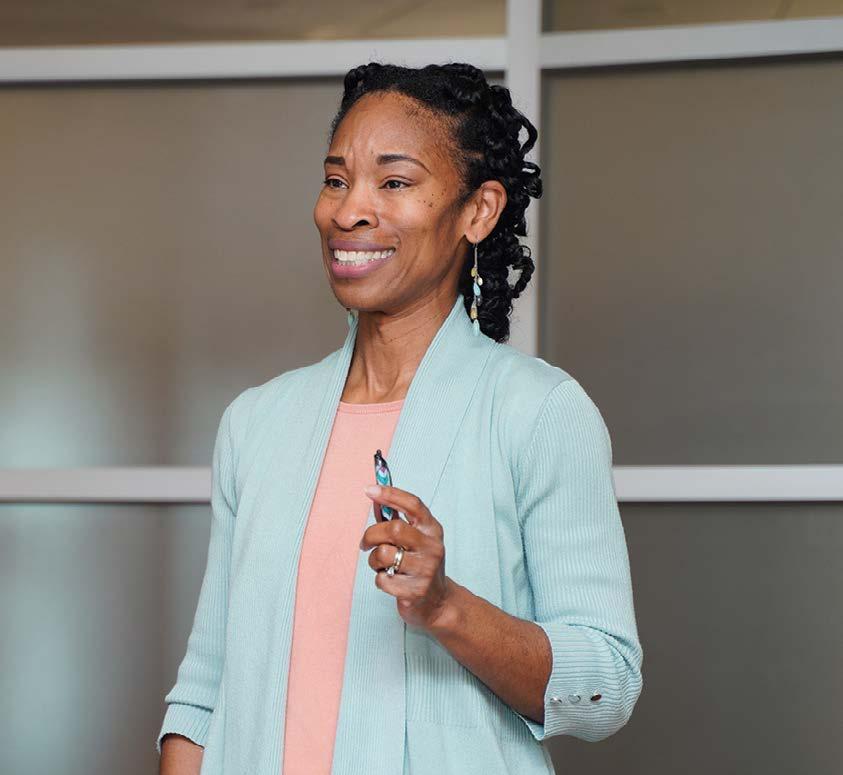
“We are preparing the next generation of scientists, researchers, pharmacists, and leaders. To achieve our mission as a School ‘to collaboratively and equitably improve the health of society,’ their education should include an understanding of persistent and pervasive inequities and strategies to advance equity and justice in their areas of expertise and in future roles,” Whittaker says.
One of the exciting new initiatives under the purview of the School’s Faculty Affairs committee, chaired by Oglesby, is integrating the School’s core values of “equity and justice” into its appointment, promotion, and tenure policies, says Whittaker. In 2022 alone, more than half of the faculty documented over 4,000 hours in EDI-related research and grants, civic and community engagement, professional development, and other areas.
After much discussion and exploration, the equity and justice guidelines were approved by the School of Pharmacy faculty in June.
Another significant initiative currently in progress is the integration of new competency-based outcomes for the PharmD curriculum in the areas of anti-racism and antioppression. This work is ongoing as a new curriculum is implemented for incoming students in fall 2024. In the short term, faculty, staff, and students will collaborate to develop a diversity statement that will be incorporated into the PharmD course syllabi. Throughout the process, faculty will be receiving guidance from a range of experts on how to cultivate an inclusive learning environment. During the
next year, the goal is to work across all the School’s PhD and MS programs to integrate themes of equity, diversity, and inclusion.
For students, incorporating EDI values means thinking about the diverse communities they will serve as professionals, Whittaker says. What are their patients’ or participants’ lived experiences, what kind of access have they had to quality health care, or how can they be better represented in research?
The promotion and tenure initiative and curriculum updates “are incredibly important to the School,” Whittaker says, “but will take time to fully implement.” While the improvements will be made incrementally, her goals are ambitious. “We’re aiming for transformation here,” she says. “I’m going for a shift.
“To realize the vision for inclusive excellence, we need to evolve our policies and practices to better align with our mission, core values, and best practices for advancing equity, diversity, and inclusion in higher education,” she says.
The School’s EDI initiative is not operating in a vacuum. It’s part of a larger effort across all seven professional schools at the University of Maryland, Baltimore (UMB) that is led by Diane Forbes Berthoud, PhD, MA. As UMB’s first chief equity, diversity, and inclusion officer and vice president, Berthoud’s job, she says, is to “lead and build capacity to accomplish systemic and sustainable change.”
Berthoud came to UMB in July 2021 to review and revise policies, practices, and procedures to expand opportunities and increase representation for students, faculty, and staff. She hopes to use already available data to track improvements in diversity and access to opportunity, and to increase transparency and accountability around what the data reveal.
One of the goals for this ambitious project is to see measurable improvements in morale, satisfaction, and
belonging across the campus community, Berthoud says. Accomplishing this requires specific efforts to attract and retain diverse talent pools, ensure that promotion and tenure policies reinforce EDI values, and expand access to learning and career opportunities for a wide range of abilities and backgrounds.
Some of these efforts involve collaboration between and among schools. For example, to diversify the student body in the School of Pharmacy’s PhD in Pharmaceutical Sciences (PSC) program and increase access for students who are historically under-represented in the sciences, the School is partnering with the University of Maryland School of Medicine’s Graduate Program in Life Sciences on an Initiative for Maximizing Student Development (IMSD) T32 training grant from the National Institutes of Health. The grant allows for recruitment of five students in the IMSD program per year into the PhD in PSC program.
As part of the program, the School of Pharmacy has developed workshops for research reproducibility and rigor and in grant writing that are offered to students in the IMSD program before their entry into the PhD program. Additionally, they have an opportunity to rotate with faculty in the summer before their first year of classes.
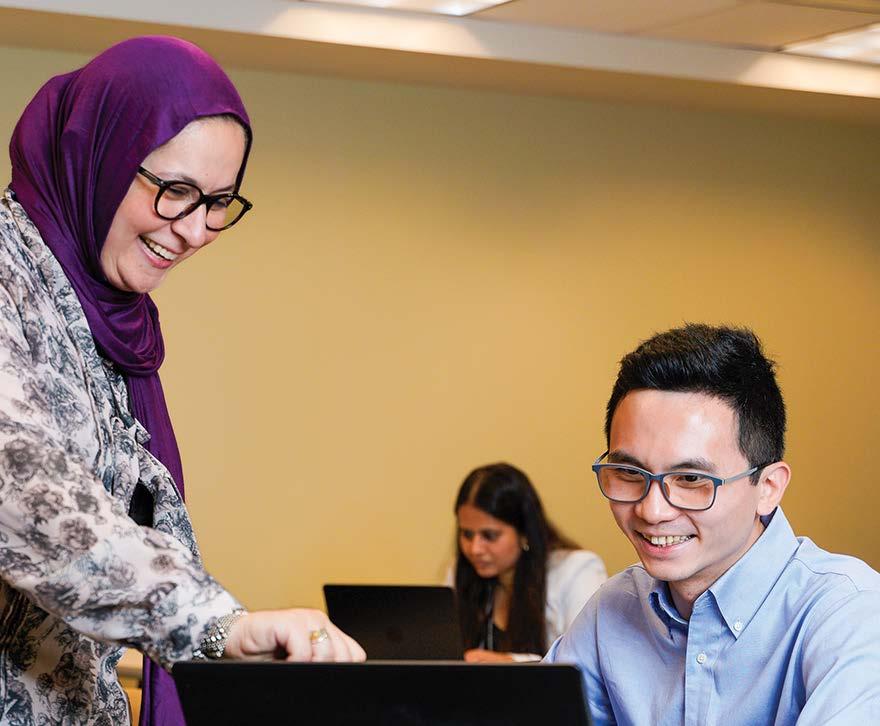
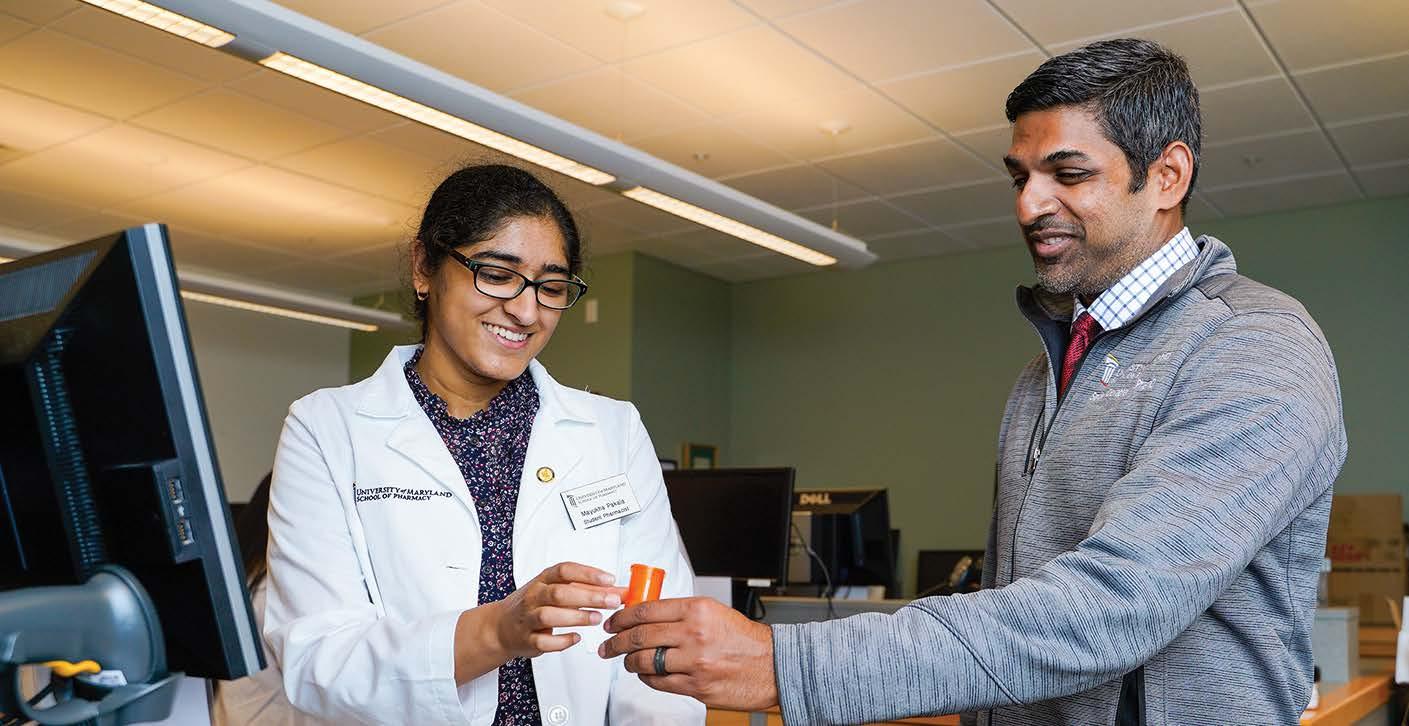
These opportunities allow them to adjust to campus life and develop relationships with fellow students. Additionally, the School is planning workshops for students and mentors to address communication between faculty and students from culturally diverse backgrounds, as well as education on microaggressions and how to foster open dialogue.
Another important piece of the overall EDI initiative is the School of Pharmacy staff, particularly in the areas of inclusion and belonging, Whittaker says. Employees completed a staff experience survey in fall 2022, as part of a UMB effort to support well-being for all. “A goal for the coming year is to partner with staff to foster an inclusive work environment through professional development
opportunities, creating an infrastructure for affinity groups, and to consider other strategies to amplify staff voice in the organization,” she says.
For Andrew Coop, PhD, professor of PSC, associate dean for academic affairs, and interim associate dean for graduate programs, the top priority for the School’s EDI effort is the accessibility piece. “When we mention EDI, we often think in terms of races and demographics,” he says. “I would like to bring out accessibility, to have us deliver education in a way that every individual reaches their potential.”
Coop notes that student demographics are changing, and that today’s students arrive at pharmacy school with different learning styles and different needs. Some students speak English as a second language. Others have sensory challenges that make video captioning and audio narration a necessity.
Offering classes in different modalities is something else the School is exploring, along with many other institutions of higher learning. “We are primarily an in-person school,” says Coop, “and we need to offer a range of in-person courses and virtual courses.” He adds that while many required courses need to be offered in person, there are electives that lend themselves to online learning.
The School is undergoing “the biggest revision of the PharmD curriculum in 20 years,” says Coop, who has been teaching at the School since 1999. In town halls on EDI initiatives, students have been asking for more opportunities to learn about structural racism and how it impacts health outcomes. And the School is responding. Currently, only one course in the PharmD curriculum, Health Policy and Systems, does a good job of incorporating these themes, he says. In a few years, these themes will be presented “by all faculty, in all courses,” he adds.
“We need to listen to our students,” Coop says. “They are far more in touch.”
The University of Maryland School of Pharmacy globally engages and leads education, pharmacy practice, scientific research, and pharmapreneurial initiatives to collaboratively and equitably improve the health of society.


• empowering learners and graduating visionary leaders
• pioneering social impact and business innovation through pharmapreneurship
• listening to all voices to equitably enrich the lives of our internal and external communities
• positively influencing the delivery of convenient and affordable health care
• leveraging pharmaceutical expertise and relentlessly collaborating to solve scientific, clinical, and social problems that matter to all citizens of the world
Pharmapreneurship is the University of Maryland School of Pharmacy’s commitment to supporting and best positioning both faculty and students to achieve their career aspirations and address our nation’s health care challenges.
The University of Maryland School of Pharmacy has received an eight-figure leadership level bequest to propel Pharmapreneurship, education, research, practice, and service - the largest single donation from an individual in the history of the University of Maryland, Baltimore.

#9 in funded research grants out of more than 140 schools of pharmacy in the country by the American Association of Colleges of Pharmacy (AACP)
$38.5 million in 2022 — National Institutes of Health (NIH), National Science Foundation, Food and Drug Administration (FDA), Centers for Disease Control and Prevention,
Agency for Healthcare Research and Quality, PhRMA Foundation, and the pharmaceutical industry.
$50 million — five-year renewal of the Maryland Center of Excellence in Regulatory Science and Innovation (M-CERSI) by the FDA.

$10 million contract from the state of Maryland for pharmacy services at state mental health facilities and to oversee review of mental health medications for children on Medicaid.
Peter Lamy Center on Drug Therapy and Aging improves the lives of older adults by optimizing medication safety and use through practice, research, and education, and a leader within the University of Maryland, Baltimore’s Age-Friendly University initiative.
$1 million gift for the Felix A. KhinMaung-Gyi, BSP ’83, PharmD, MBA, Endowed Memorial Professorship in Pharmapreneurship.
$30,000 Gyi Scholarship — a full year of tuition for a pharmacy student who has demonstrated a commitment to pharmapreneurship. Largest scholarship in School history.
$100,000 Natalie D. Eddington Pharmapreneurship Award for Health Care Innovation for pharmacy student pitch competition, the largest award of its kind nationally.
Nine $10,000 Wagner Scholarships — awarded to students in the Pharmapreneurship Pathway, providing a platform to explore business ideas and ventures.
Pharmapreneurship Pathway
— selective curricular opportunity for pharmacy students to pursue special interests in innovation, entrepreneurism, and creativity.
Center for Innovative Pharmacy Solutions’ (CIPS) E-Health Center provides comprehensive medication management services to health systems, physicians offices, and insurers through a HIPAA-compliant app and telehealth and telephonic platforms.
PATIENTS Program boasts an interdisciplinary team of community partners and researchers working for health equity in West Baltimore by engaging underserved populations.
$46 million — Center for Translational Medicine is co-PI on a grant from the Defense Advanced Research Projects Agency to create an artificial blood product.


$5 million — FDA funding for the Center for Research on Complex Generics in partnership with the University of Michigan College of Pharmacy
$5 million contract to CIPS from physicians offices and health care systems to embed pharmacists in primary care practices under the Centers for Medicare and Medicaid Services’ unique Maryland Primary Care Program.
Maryland Poison Center — 50 years, 2.5 million calls handled by pharmacists and nurses with more than 210 years of combined experience.
$1.1 million NIH grant for Initiative for Maximizing Student Development to increase the number of students from under-represented groups in UMSOP’s PhD in Pharmaceutical Sciences program and the School of Medicine’s Graduate Program in Life Sciences program.
MS in Pharmaceutical Sciences — every student completes a six-month biopharmaceutical internship in the pharmaceutical industry, including at AstraZeneca and the National Institute of Standards and Technology, leading to employment opportunities.
Innovative and diverse academic programs for PharmD students to customize their degrees to achieve their career goals: one PharmD, three PhDs, six MS, 10 dual degrees.
2023 APhA-ASP National Chapter of the Year Award — first win in School history for chapter’s work in patient care outreach, education, and awareness.
Home of the nation’s first MS in Medical Cannabis Science and Therapeutics, with nearly 500 graduates in the program’s first three years.
Alumni Impact — More than 7,000 alumni; founders of companies such as CorrectRx Pharmacy Services, Pricklee Cactus Water, OneWorld Health, Medicines360, Merck Sharpe and Dohme, Noxell Corp., Nutramax Labs, and King Pharmaceuticals.
UMB’s Student Counseling Center hosted some furry friends for students to hang out with in October while discussing mental health topics. From left, Eileen Zheng and Gina Chen of the Class of 2024 and Laura Soon of the Class of 2025 take advantage of the study break to hang out with the dogs while discussing the stigma surrounding mental health.
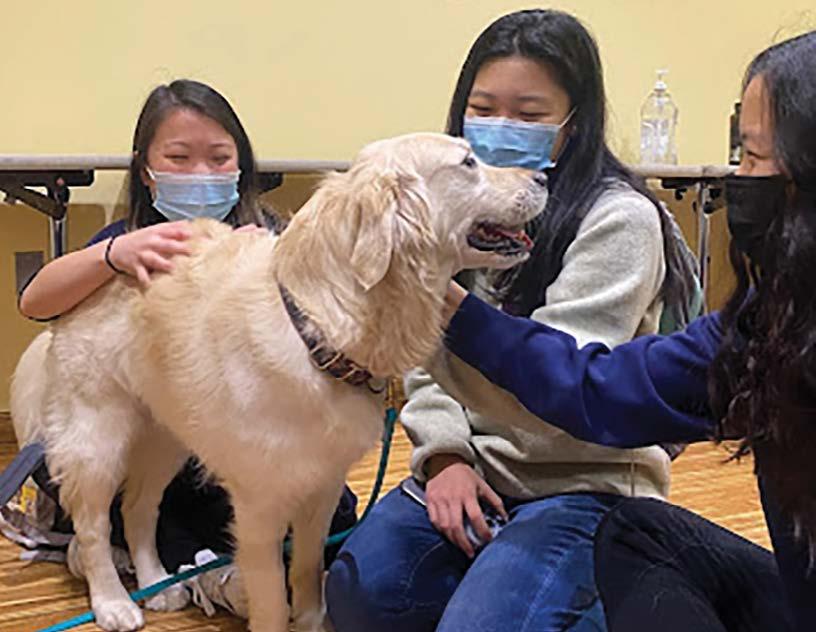
On Oct. 29, the Student Government Association hosted its annual Healthy Halloween event in Pharmacy Hall for local schoolchildren. American Association of Psychiatric Pharmacists Executive Board members David Leung (Class of 2025), Adriana Campos (Class of 2024), Charlotte Spry (Class of 2025), and Oanh Hoang (Class of 2026) staffed the table to discuss stress with the students.
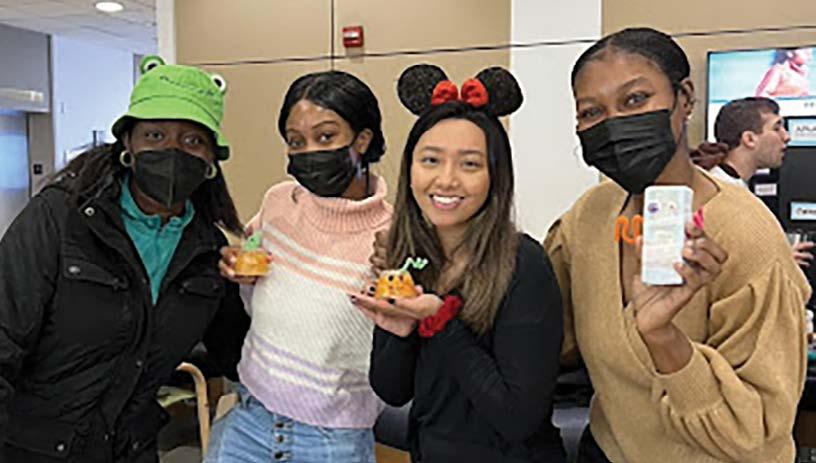
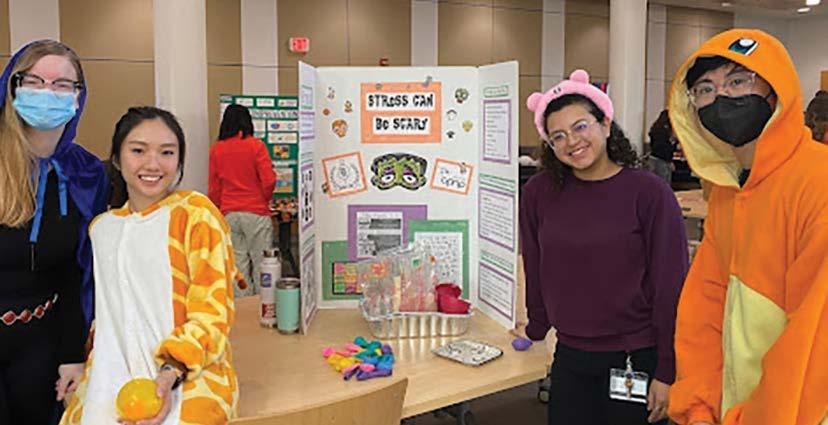
Members of the American Association of Psychiatric Pharmacists, the American Society of Consultant Pharmacists, the American Pharmacists Association-Academy of Student Pharmacists, Kappa Psi, and Phi Delta Chi participated in a Walk to End Alzheimer’s event in Hunt Valley, Md., on Oct. 22 to support the Alzheimer’s Association.

The Academy of Managed Care Pharmacy (AMCP) Nexus conference at the National Harbor in October allowed students to learn about career paths and innovations within managed care and network with managed care and industry professionals. AMCP student chapter members from left: Chenchu Vignesh Pernati, Viviane Tang,

Tamrakar, Rebecca Faulkner, and Valeria Diaz Fernandez, all of the Class of 2024; Laura Soon, Class of 2025; and Jiwon Oh, Class of 2026.
Phi Lambda Sigma and Rho Chi partnered to host their annual Student FaculTEA Party on Nov. 11 in Pharmacy Hall, which was an opportunity for students to interact and network with faculty members over pastries, coffee, and tea. The event also included a welcome address from then-Dean Natalie D. Eddington, PhD
On Feb. 2, Phi Lambda Sigma (PLS) hosted its annual Meet the Candidates Night – an opportunity for students eligible for membership to interact and network with current PLS members. PLS supports pharmacy leadership by recognizing leaders and fostering leadership development.

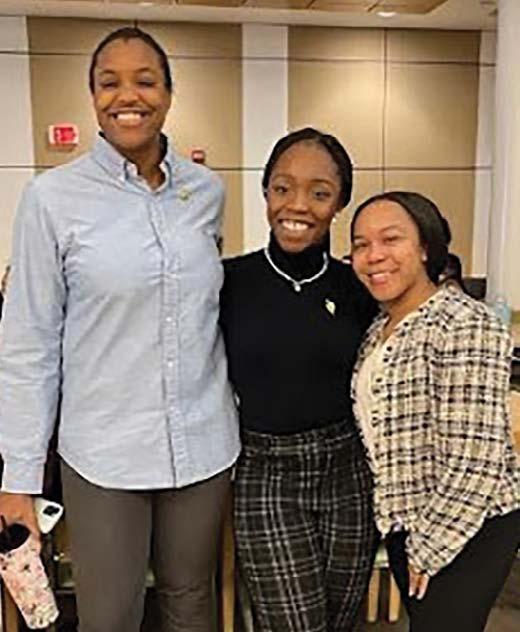
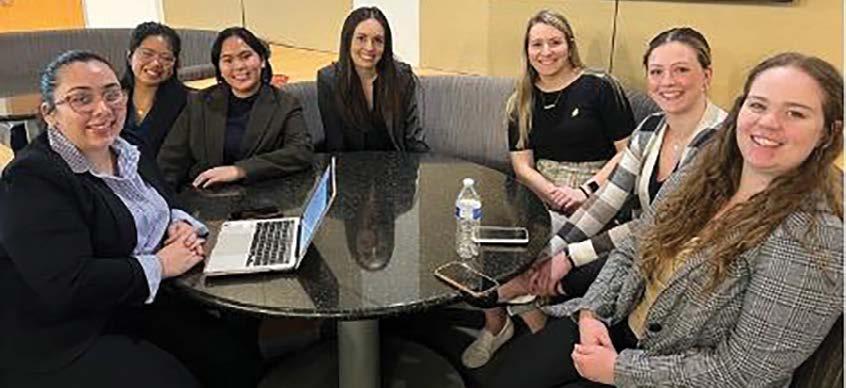

On Feb. 19, members of the American Pharmacists Association-Academy of Student Pharmacists Executive Board attended the Maryland Pharmacists Association’s (MPhA) midyear meeting in Annapolis, networking with pharmacists and learning about over-the-counter hearing aids, Black maternal mortality, navigating communication in limited English proficient patients, and pharmacy law.
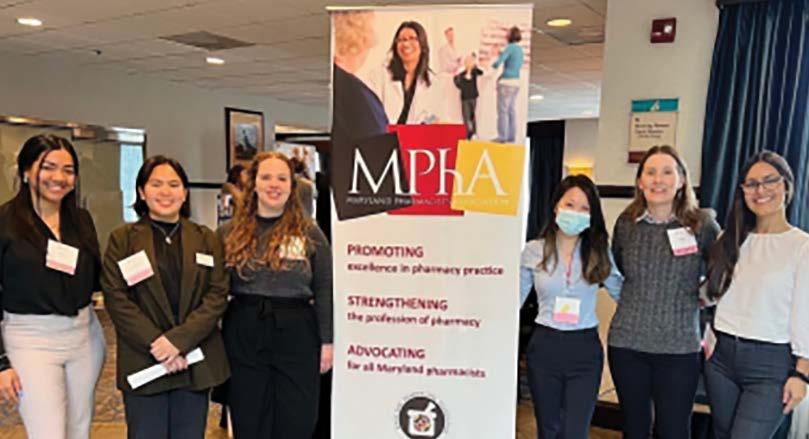

The School of Pharmacy’s American Pharmacists Association-Academy of Student Pharmacists (APhA-ASP) chapter was recognized at the APhA Annual Meeting in March in Phoenix, Ariz., with the National Chapter of the Year Award, a first time win in chapter history. It also was recognized with an Operation Heart award and first runner-up award for Operation Reproductive Health.
The Industry Pharmacists Organization hosted its annual U.S. Food and Drug Administration (FDA) panel event on March 16 via Zoom. Students had the opportunity to interact with FDA pharmacists and gain insight on their careers.

Sisters and Pediatric Pharmacy Association members Mehak Muneer (left) and Naiha Muneer, both of the Class of 2026, had a blast at UMB’s first wellness fair since 2019 on April 3, where they discussed seasonal allergies prevention and treatment.
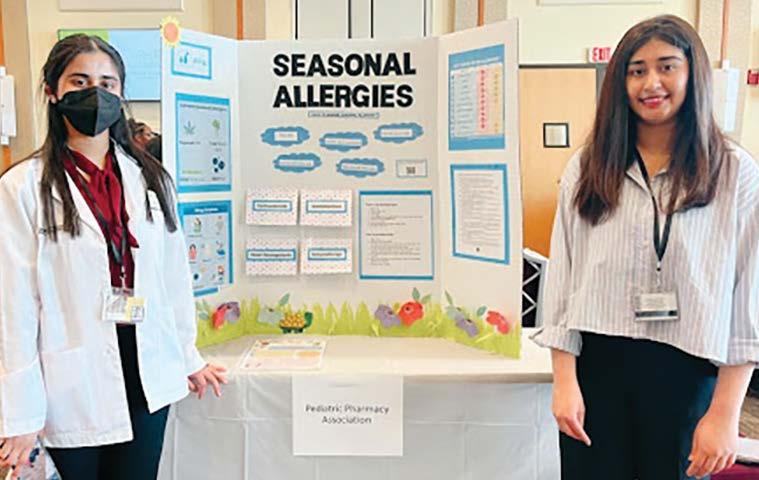 From left: Dafne Espinal Pena, Class of 2024; Ysabelle Calara and Maethe Butterfield, Class of 2025; and Eileen Zheng, Elisa Sangriu, and Anyelis Rosario, Class of 2024.
Anyelis Rosario, Class of 2024 and chapter president, accepts the Chapter of the Year Award.
From left: Dafne Espinal Pena, Class of 2024; Ysabelle Calara and Maethe Butterfield, Class of 2025; and Eileen Zheng, Elisa Sangriu, and Anyelis Rosario, Class of 2024.
Anyelis Rosario, Class of 2024 and chapter president, accepts the Chapter of the Year Award.
The Student National Pharmaceutical Association’s (SNPhA) Annual International Fiesta, held on April 4, celebrated diversity among students at the School of Pharmacy. The mainstays of the event — the fashion show and international food buffet — celebrated the School’s plethora of cultures. Activities such as global health trivia challenged students to think outside the box to apply the knowledge acquired from their therapeutics and pharmacotherapy courses. SNPhA serves the underserved, highlights minority pharmacists, and embraces diversity.
As part of Students Promoting Awareness’ Student Committee on Drug Abuse and Education, India Gwynn, Class of 2024, makes a presentation on opioid misuse and safety to Patterson High School students in December.

The University of Maryland, Baltimore (UMB) Biophysical Society student chapter — based at the School of Pharmacy — organized a series of events to mark 2023 Biophysics Week, which was March 20-24. Events included a coding discussion with high school students in the UMB CURE Scholars Program, a coffee social with the Department of Pharmaceutical Sciences, and a lecture on computational methods in biophysics with guest speakers.
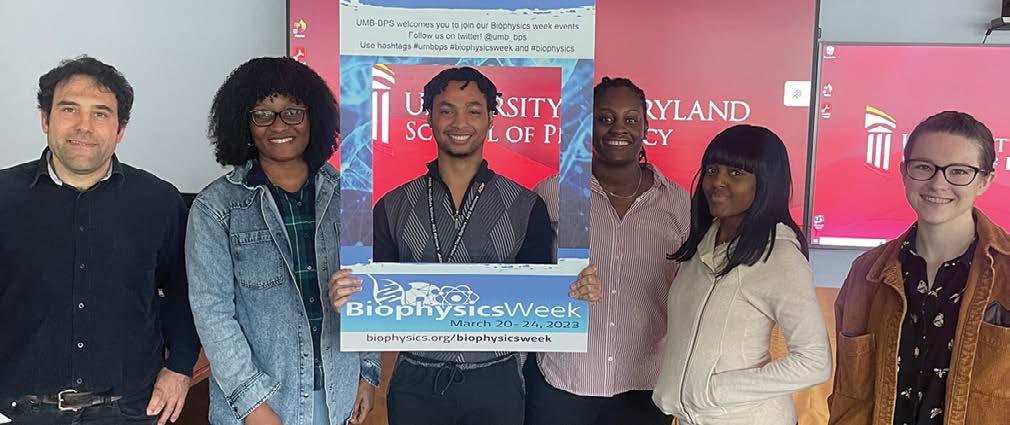
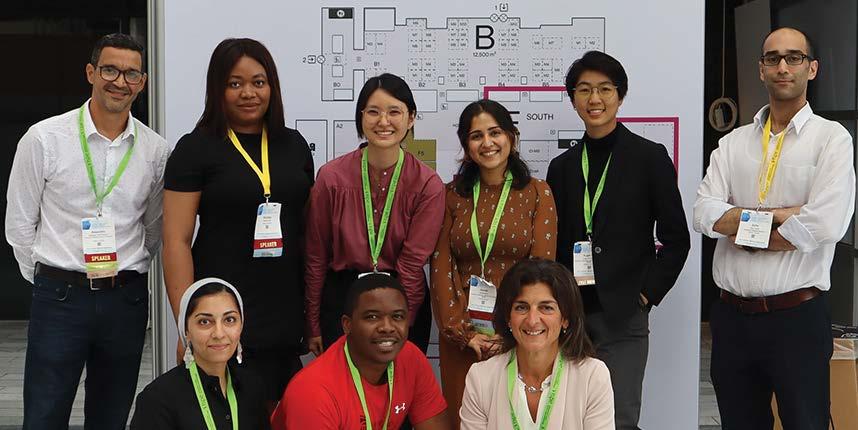
Graduate students in the Pharmaceutical Health Services Research graduate program in the Department of Practice, Sciences, and Health Outcomes Research (P-SHOR), along with postdoctoral fellows and faculty, attended and presented at the International Conference on Pharmacoepidemiology & Therapeutic Risk Management in Copenhagen, Denmark, in August 2022.

Alexandria Chan, Christopher Goodis, Catherine Ladipo, and Nhu Truong, graduate students in pharmaceutical sciences (PSC), received 2022-2023 PSC Merit Awards. Chan also received a 2022-2023 Chemistry-Biology Interface Fellowship Award. Ladipo received the 2023-2024 Genentech Meyerhoff Graduate Fellowship. And Truong received the second-place poster award at the National Institute for Pharmaceutical Technology & Education’s annual research conference.
Haixi Cui and Yihan Wang, graduate students in PSC, received the department’s Dr. Gerald P. and Margaret M. Polli Graduate Student Travel Award to attend the American Association of Pharmaceutical Scientists annual conference.
Bernard Bright Davies-Teye, MD, MPH, a student in the Pharmaceutical Health Services Research (PHSR) Graduate Program, received the program’s 2023 Dr. Arthur Schwartz Memorial Scholarship Award.
Student pharmacists Kristine Gem Dones, Ubong-Idara Obot, and Jamie Padilla won round one of the American College of Clinical Pharmacy’s 2023 Clinical Research Challenge.
The following student pharmacists were 2022-2023 recipients of the School of Pharmacy’s Wagner Family Scholarships in Pharmapreneurship: Madison Dormer, Emily Francis, Sean Kim, Alex Livingston, Yang Lu, Simone Nasroodin, Meya Ngundam, Iulia Opran, and Alexandra Wilson
Student pharmacists Rebecca Faulkner and Emily Ly were members of an interdisciplinary student team from the University of Maryland, Baltimore (UMB) that won the Wildcard prize in the 2022 DC Public Health Case Challenge.
Aziza Frank, graduate student in PSC, received the Victor E. and Dorothy M. McIntosh Award from UMB’s Initiative for Maximizing Student Development (IMSD) and was runner-up for UM Ventures’ Graduate Translational Research Award.
Lena Grogan, a graduate student in PSC, received a 2022-2023 UMB Faculty Center for Teaching and Learning Award.
Chia-Yun Hsu, BS, MS, Uzma Pathan, BPharm, MPharm, MS, and Dominique Seo, BA, MPH, students in the PHSR Graduate Program, received the program’s 2023 travel scholarships. Honorary recipients were Dami Onasanya, MPH, MD, Salome Ricci, PharmD, MS, Yun-Yi Pan, PharmD, and Chintal Shah, MS, BPharm
Matthew Hursey and Yulemni Morel, graduate students in PSC, received 20222023 PSC Fellowship Awards. Hursey also received a one-year, $10,000 grant from the American Foundation for Pharmaceutical Education.
Danielle Jateng and Agbo-oma Uwakweh, graduate students in PSC, received 20222023 UMB IMSD/Meyerhoff Fellowships.
Haeyoung Lee, PharmD, MS, a student in the PHSR Graduate Program, received the program’s 2023 Harris Zuckerman Scholarship.
Tsung-Ying Lee, BPharm, MS, and Sarah Tanveer, MS, students in the PHSR Graduate Program, received the program’s 2023 Donald O. Fedder Memorial Fellowship.
Nathaniel McClean, graduate student in PSC, received a 2023 Outstanding Presentation Award at UMB’s 45th Graduate Research Conference.
Nicolas Montes, graduate student in PSC, received a National Institutes of Health (NIH) Diversity Supplement Award.
Juliet Obi, graduate student in PSC, received the Student Research Achievement Award at the 2023 Biophysical Society Annual Meeting.
Dafne Espinal Pena, a fourth-year student pharmacist, received a Maryland Pharmacists Association student scholarship.
Aarion Romany and Ally Smith, graduate students in PSC, received spring 2023 Dean’s Teaching Fellow Awards. Smith and Jake Weiner, graduate student in PSC, received fall 2022 Dean’s Teaching Fellow Awards.
Brianna Scotland, graduate student in PSC, received a 2022-2023 Genentech Meyerhoff Graduate Fellowship and a 2023 Outstanding Presentation Award at UMB’s 45th Graduate Research Conference.
Student pharmacist Belinda Tamrakar received the School’s 2022-2023 Felix A. Khin-Maung-Gyi Memorial Scholarship for Pharmapreneurship.
Sarah Tanveer, MS, a student in the PHSR Graduate Program, received a one-year, $54,000 grant from the Oak Ridge Institute for Science and Education.
Ayanna Williams, graduate student in PSC, received an NIH Research Supplement to Promote Diversity in Health-Related Research Award.
Lending an ear when students need it is perhaps the most important job Kristina San Juan, MBA, performs as director of student services in the Office of Graduate Programs at the School of Pharmacy. And it’s the most fulfilling.

The Office of Graduate Programs supports more than 700 students in the School’s in-person and online PhD, MS, and certificate programs. But the one-on-one relationships are what mean the most to San Juan.
“Students often stop by when they’re having a bad day. That’s part of our job, too,” says San Juan, whose “great team of six dedicated and talented staff members” supports recruitment and admissions, registration, planning and coordination of events, and career services. “We passionately share the goal of improving services that impact the student experience.”
Part of the School of Pharmacy since 2013, San Juan admits “no two days are alike” in her busy area, where she helps whittle down the 150 annual Pharmaceutical Sciences (PSC) applications to the 15 students who are accepted. But she does have a favorite event.
“Every other year we host a graduate gathering where our current students meet alumni and hear about their careers. The networking benefits the students, but it’s also fun for us to catch up with our former students.
“I love it when a student will just randomly stop by to show me pictures of their wedding or to tell me they’re expecting their first child. It’s very special to be included in those milestones.”
Academic milestones are just as satisfying, such as students successfully defending their doctoral dissertations or finding work. “Most of our PhD students are in school 5½, maybe six years, so we go through the ups and downs with them,” says San Juan.
Danté Johnson, PhD, who graduated in May, says the PSC graduate programs “could not run without Kristina. Her guidance and influence are felt from the moment you come for interviews to your final day on campus. She’s more than a coordinator; she’s a mentor and friend. Her door was always open for a quick hello, a catch-up chat, or if you needed a place to hide or cry when failed experiments and intense meetings with the professor made the day difficult.”
A Filipino who is proud to be among those at the University of Maryland, Baltimore working on a training grant to enhance diversity in the biomedical workforce, San Juan says she is passing along the kindness shown by her then-supervisor Sarah L.J. Michel, PhD, professor of PSC and now interim dean.
“She’s been more than a boss these last 10 years,” says San Juan, who has progressed from program coordinator to director. “She’s been a big inspiration; I look up to her as a mentor.”
Growing up in Harford County, Md., San Juan once dreamed of being a nurse and worked in the Johns Hopkins School of Nursing for nine years. But the married mother of two has found a home at the School of Pharmacy.
“Starting with former Dean Eddington down to the students, faculty, and staff, there was a real sense of inclusion, acceptance, and welcomeness you felt right off the bat,” says San Juan. It’s a family atmosphere that wins over students on their first visit. “Now being here for so many years, it really is a sense of community. I’m very, very lucky to be at the School of Pharmacy.”
Michel says she is the lucky one. “Kristina is the colleague everyone dreams of having,” Michel says. “She is kind, resourceful, and creative, anticipating challenges with multiple solutions at the ready all while encouraging those who report to her to develop in their own careers.”
Mathangi Gopalakrishnan, PhD, MS, an assistant professor in the School of Pharmacy’s Department of Practice, Sciences, and Health Outcomes Research and a member of its Center for Translational Medicine, tells an interesting story about her career path. As with many successful people, she followed her interests and passions and always seemed to be in the right place at the right time — perhaps even when she didn’t realize it.
“Following the advice of one of my teachers, and with support from my parents, I joined the pharmacy program at the Birla Institute of Technology and Science in Pilani, Rajasthan, India,” she recalls. “I became very interested in pharmacokinetics and pharmacology and received my bachelor’s and master’s degrees in pharmacy in the late 1990s.”
Gopalakrishnan then accompanied her husband, Atul, to the United States where he entered a postdoctoral program at the University of Florida, Gainesville. Eventually the couple moved to Maryland where her husband went on to work at the U.S. Food and Drug Administration.
While in Maryland, and by chance, Gopalakrishnan had an opportunity to work informally on research projects related to pharmacometrics.
“That work really opened my eyes,” she recalls. “As a result, I realized that fundamental statistical knowledge was essential for pharmacometrics.”
With encouragement all around her, she enrolled at the University of Maryland, Baltimore County where she earned both
a master’s degree (2007) and a PhD (2013) in statistics.
A faculty member at the School of Pharmacy since 2013, Gopalakrishnan has worked on several quantitative translational research projects and has contributed to the growth of the MS in Pharmacometrics program since its inception. She is now director of the program.

Bringing expertise in both pharmacy and statistics to a wide range of research, she has authored and co-authored numerous papers using statistical and pharmacometric methods.
In a recently published study, she and her colleagues used pharmacometric and statistical methods to reassess unfractionated heparin dosing for pediatric patients by modeling the pharmacokinetic and pharmacodynamic relationship to identify dose-escalating schemes that can achieve therapeutic targets sooner.
“Questions regarding optimal dosing are important,” she explains. “Forecasting with data can help us find optimal dosing and aid in making clinical decisions.”
Gopalakrishnan and her colleagues also recently investigated how “machine learning” can be used in pharmacometrics. Machine learning, a branch of artificial intelligence and computer science, uses data and algorithms to discover patterns and also imitate how humans learn.
The researchers used this machine learning to identify placebo responders to better inform the inclusion/exclusion criteria for clinical trials and increase the success of binge eating disorder studies as placebo responders had previously represented a high percentage of response.
“We designed algorithms that identified placebo responders with 88 percent sensitivity and 72 percent accuracy, thereby more accurately targeting participants who responded to treatment rather than placebo,” explains Gopalakrishnan.
Outside of work, Gopalakrishnan loves to travel with her family. And, like their parents, her daughters, Nandini, 17, and Vaishnavi, 14, are big fans of the National Football League. The girls like the New England Patriots while mother and father are partial to the Washington Commanders, though they all enjoy attending Baltimore Ravens games.
“I also love cooking,” she says. “I do some of my best thinking about research while I am cooking.”
On Friday nights, you might find him playing trumpet with a local band. On Saturdays, woodworking. On Sundays, biking up the Sibillini Mountains and — three times weekly — hitting the gym.
These are the personal pursuits of Carlo Polidori, PhD, an associate professor of pharmacology at the University of Camerino (UNICAM) School of Pharmacy in Italy and one of nearly 900 University of Maryland School of Pharmacy (UMSOP) preceptors, who generously give of their time and expertise to help train “the next generation.”
Of the many hats that Polidori wears professionally — scientist, researcher, published author, associate editor for the European Journal of Hospital Pharmacy, invited speaker at prestigious events like the European Society of Clinical Pharmacy, and member of numerous committees — Polidori says it’s his role as teacher and mentor that he relishes most.
“I love to be a professor, in touch with the students,” he says. “That’s my first love.”
On the UNICAM campus, Polidori serves as a preceptor in its International Pharmacy Practice Administration course. Since 2018 he’s enjoyed a partnership with UMSOP where its preceptors — practicing pharmacists and other professionals who oversee students on offsite rotations — provide more than 30 percent of the School’s PharmD curriculum.
“Since 2018, UMSOP has sent 10 students for five-week advanced practice rotations to hospitals all over Italy, including Rome at Agostino Gemelli, where the Pope is cared for,” says Agnes Ann Feemster, PharmD, BCPS, assistant dean for experiential learning at UMSOP and associate professor of practice, sciences, and health outcomes research. UMSOP also has hosted a student from UNICAM.
“Not surprisingly,” says Feemster, “we often receive more interest in the Italian training experiences than we have availability. Each time, Dr. Polidori has arranged for additional opportunities to accommodate our students. He is an extraordinary host, often taking the students out for dinners and sightseeing, always having their best interests at heart and looking for opportunities for them to grow professionally and personally.
“Because he has connections all over Italy, Europe, and the world and through his work with the European Association of Hospital Pharmacists,” Feemster adds, “Dr. Polidori has been instrumental in making connections for the School of Pharmacy that, hopefully, will result in additional training sites across Europe and perhaps expand our partnership with UNICAM beyond the School of Pharmacy to the University of Maryland, Baltimore at large.”
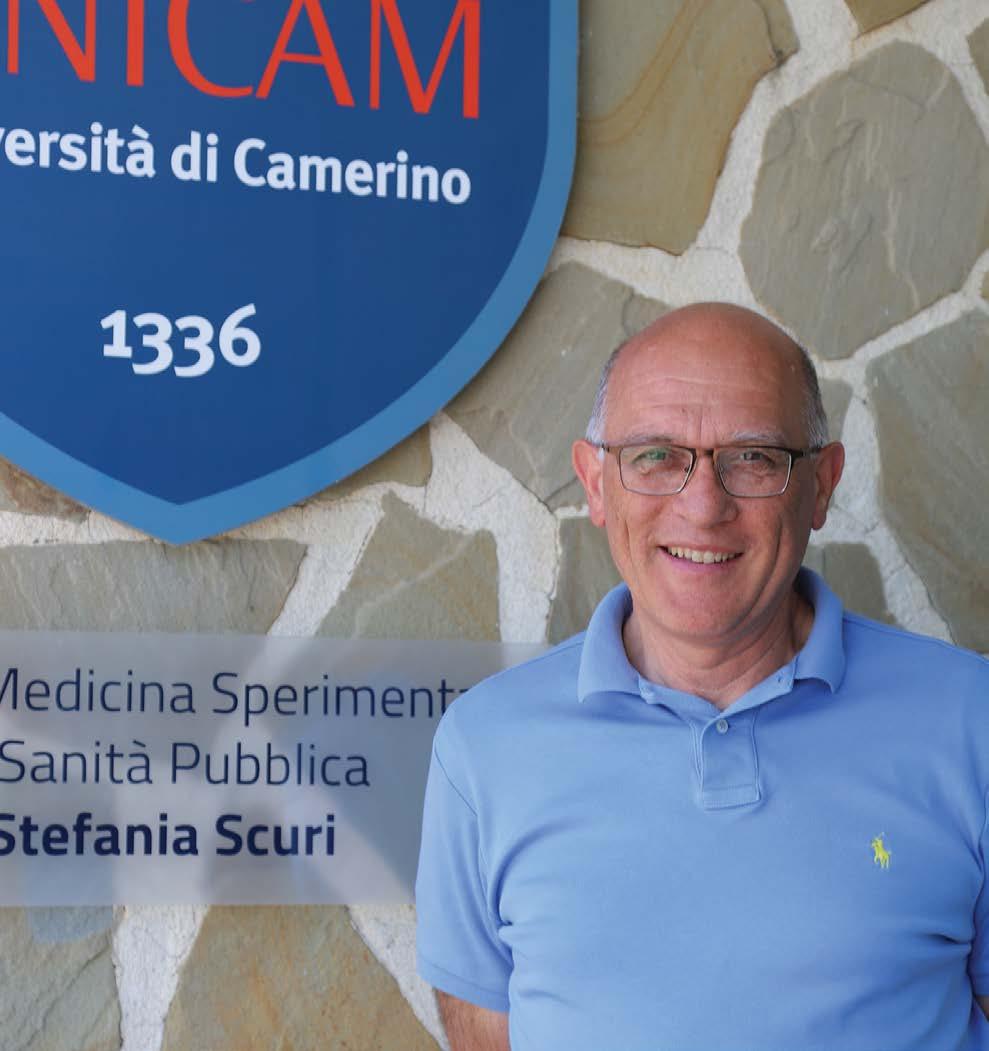
Polidori insists that the partnership benefits his Italian-based students as much as their Maryland-based peers. “They each learn from the other.”
UMSOP students have nothing but praise for their experiences in Italy.
Rose Prizzi, a student pharmacist who visited Polidori before graduating in May, saw operations of the famed Loccioni facility, a large manufacturer with a health care arm that focuses on intravenous medication compounding technology. “It’s technology that’s delivered robotically and used by the University of Maryland Medical System as well as hospitals around the world.”
Adds 2023 graduate Amanda Summers: “Apart from experiencing the amazing clinical aspect of this rotation, we experienced Italian culture, traveled to Rome, saw ancient architecture, and ate authentic Italian cuisine. I am extremely grateful to everyone I met in Italy,” she says, “especially Dr. Polidori. This rotation was a once-in-a-lifetime experience, and I highly recommend it to all student pharmacists who want to gain insight into international health practices.”
For now, Polidori awaits his next cohort of UMSOP students in October.
Meanwhile, he plays his trumpet daily, in the past 15 years has crafted 40 custom windows and 15 doors for his “country house,” and will — most likely — break a sweat often.
“I always push my students,” he says, “and myself.”
Growing up in Warsaw, Poland, Jan Sieluk, PhD ’18, knew by the age of 6 that he wanted to be a pharmacist. Inspired by a local pharmacist, the profession became, and still is, his passion. While studying at the Medical University of Warsaw, a favorite professor of Sieluk’s asserted that every pharmacist should know the economic aspects of their profession.
“This observation guided my career, and I became fascinated by the intersection of pharmacology and economics,” says Sieluk. Majoring in pharmacoeconomics, for the equivalent of a PharmD degree at the Medical University of Warsaw, Sieluk won a highly coveted and competitive award that allowed him to study in an accelerated learning track at the university and work at GlaxoSmithKline in Warsaw.
He furthered his training in Hungary, Israel, and Singapore, increasing his understanding of the mechanisms governing the European market of medicines from an economic perspective. This experience underscored for Sieluk the observation that innovations within the pharmaceutical industry are not introduced locally, but on a worldwide scale. Along the way, besides being fluent in his native Polish and in English, Sieluk picked up the basics of German, Russian, Hungarian, and Spanish.
In 2018, Sieluk earned a PhD in pharmaceutical health services research (PHSR) within the pharmacoeconomics track from the University of Maryland School of Pharmacy. Following graduation, he worked for four years at Merck & Co., Inc., as associate director of outcomes research in oncology. In 2022, he joined Bristol Myers Squibb, where he is director of worldwide health economics and outcomes research, hematology.
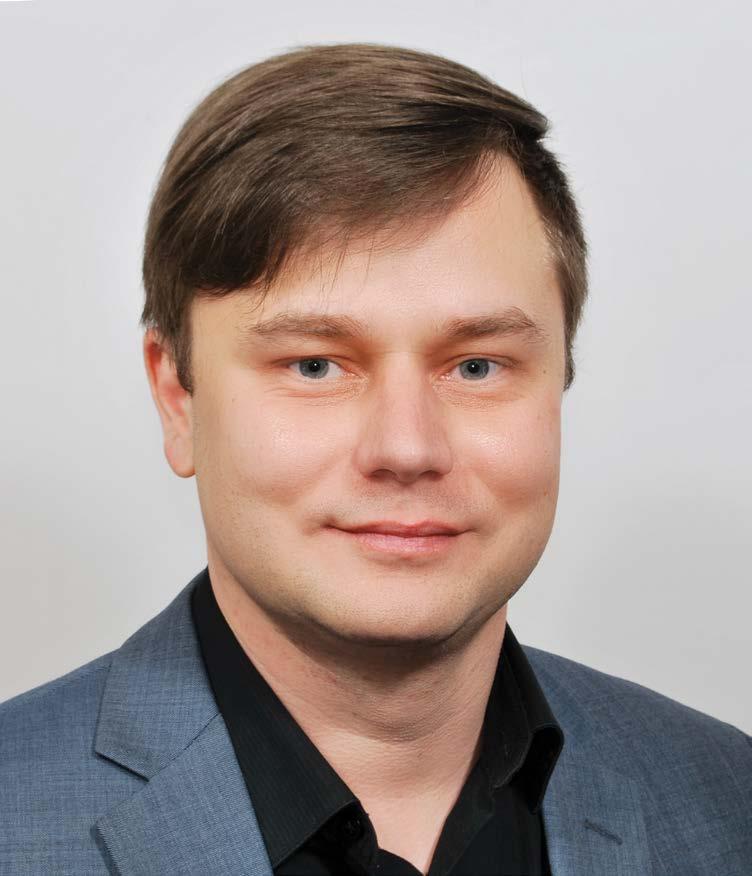
Much of the knowledge Sieluk depends on daily — pharmacoeconomics, health services, outcomes research, pharmaceutical sciences, international research consortia, patient access to drugs in the U.S. and Europe — was acquired during his education at the School of Pharmacy.
“I left the University of Maryland a different person than who I was in Europe,” says Sieluk. “The PHSR program is so comprehensive and internationally recognized along with its expert faculty. Furthermore, the School of Pharmacy’s proximity to Washington, D.C., provides students with exposure to major policy-related issues. The program gave me all the tools to prepare for a career and leadership role in global pharmacoeconomics in American multinational pharmaceutical enterprises.”
C. Daniel Mullins, PhD, professor of practice, sciences, and health outcomes research at the School, was Sieluk’s doctoral advisor. “Jan was one of the most inquisitive students I’ve mentored,” Mullins recalls, “and curiosity and inquiry are the hallmarks of an outstanding PhD-trained researcher. He was committed to doing whatever was necessary to achieve success. He proved to be capable of success as a student and continues to do so as a professional in the pharmaceutical industry.”
Meanwhile, in the little time that remains after a full day (and sometimes, evenings) of demanding work, Sieluk turns to his hobbies — collecting books, working out problems in quantum physics, and studying astronomy — to unwind.
Due to a loving family, he says, he acquired values from home. For the last six years, Sieluk has been a generous donor to the University of Maryland School of Pharmacy because, he explains, “it’s the right thing to do.” By participating in an employer-matching donor program, Sieluk’s generosity has been enhanced.
Although he never asked for it as a student, Sieluk understands the importance of outside help. His classmates and faculty at the School of Pharmacy became his new family, making sure he had proper housing, food, and plenty of support.
Says Sieluk: “Thanks to the School and grants from philanthropists, we were able to function and thrive as students. I’m glad to continue that tradition.”
Many have called Jacquie Cohen Roth, MS ’21, a firecracker or a pistol, terms she won’t dispute. She, however, prefers “change maker” and today is doing just that with the successful launch of two medical cannabis companies and a nonprofit as one of the first graduates in the University of Maryland School of Pharmacy’s Master of Science in Medical Cannabis Science and Therapeutics program in 2021 — the first program of its kind nationwide.
A self-described overachiever, the New York native graduated from Syracuse University Maxwell School of Citizenship and Public Affairs with a double major in economics and policy and a minor in international political economics. In 1982, she moved to Maryland where she spent her early days in the publishing world — first with Chesapeake Life magazine, then as publisher/executive editor of Maryland Physician magazine and Chesapeake Physician, both lauded resources for health care providers throughout the mid-Atlantic region.
In 2017, Cohen Roth narrowed her health care focus to one area specifically — the emerging field of medical cannabis, a movement that first took off in the western part of the U.S. and steadily moved east. Today, 38 states — including Maryland — have legalized medical cannabis. Cohen Roth says it’s beneficial for stress and pain management and certain illnesses such as anxiety, depression, and dementia.
As founder of CannabizMD, Cohen Roth formed an entity that she says “creates an ecosystem” designed to educate, build, and engage this captive and growing community that includes patients, providers, policymakers, and advocates. Its website offers a robust platform that provides the latest news and resources related to medical cannabis developments; spotlights best practices, upcoming conferences and events; and features patient testimonials.
Cohen Roth has served as executive director of the Maryland Medical Cannabis Trade Association and was named to Marijuana Business magazine’s “Women to Watch in 2019” list. She is a soughtafter speaker at industry events around the world.
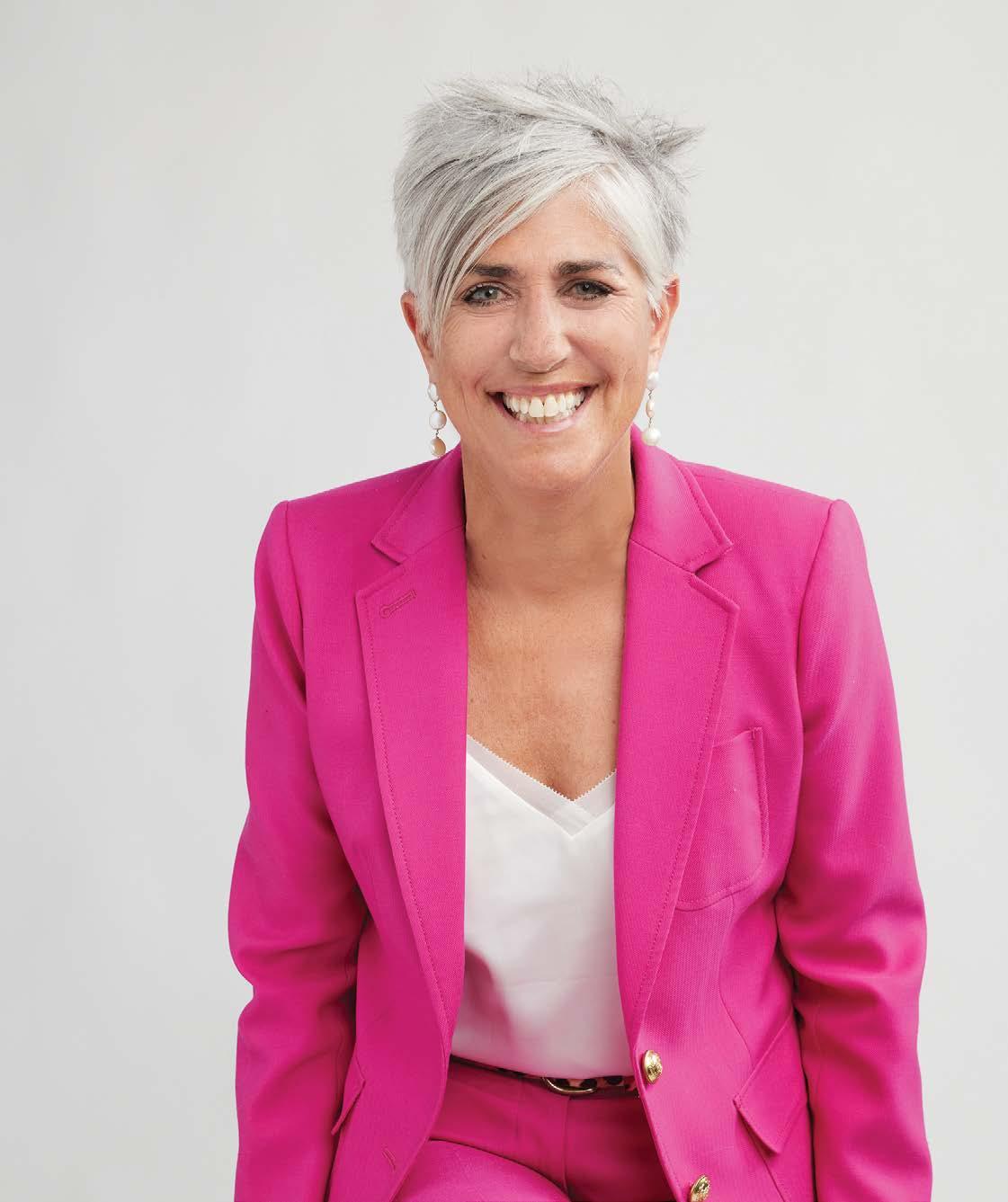
In 2022, the Annapolis resident went one step further when she founded the Tea Pad Foundation LTD, a professional networking group for the cannabis industry and especially for those less advantaged. Both CannabizMD and Tea Pad are social enterprises committed to social change.
“Tea Pad’s mission is to break down barriers to entry into the cannabis industry, empowering access, and advancement — no matter gender or race — via education and tackling issues of diversity and inclusiveness,” says Cohen Roth. Proceeds of Tea Pad events fund fellowships that provide women and people of color a solid foundation for careers in science, technology, engineering, and medicine.
“There was nothing holding me back," says Cohen Roth, “and I want that for others.”
In January 2022, Cohen Roth became an adjunct professor at the School of Pharmacy, where she teaches state and federal cannabis laws and policies and medical cannabis advocacy for patients and public health in the MS program.
“The fourth best decision I ever made,” Cohen Roth says of her UMSOP master’s experience, adding that only the birth of her three daughters, all now in their 30s, supersedes.
“Jacquie is a superstar in the medical cannabis space, and I’m proud to call her a colleague, friend, and alumna,” says Leah Sera, PharmD ’10, MA, BCPS, co-director of the MS program and associate professor of practice, sciences, and health outcomes research. “Since I met her, she has been a staunch supporter of our MS program and is enthusiastic, generous, friendly, and a pioneer in the field.”
For 15 years, the University of Maryland School of Pharmacy thrived under the leadership of Dean Natalie D. Eddington, PhD ’89, FAAPS, FCP, who stepped down at the end of May. Our faculty, staff, and students are grateful for her dedication and encouragement. During her tenure, she strengthened the School’s foundation to support the next generation of health professionals, practitioners, and researchers.
In the coming months, we will welcome our next dean. With a new dean there are sure to be changes. Change is inevitable, but a few things will remain the same:
1. The School will continue graduating highly trained professionals who will positively impact education, scientific research, pharmacy practice, and community engagement.
2. Our alumni will continue to be change makers along their chosen career paths. We want to be sure that our alumni’s feedback about the School is accurately captured to be shared with the incoming dean, so I ask that you complete our most recent survey sent to your email. If you did not receive the survey, please email me at ggriffith@rx.umaryland.edu
I am grateful for the dedication of you, our alumni, in working to make the University of Maryland School of Pharmacy the best that it can be. Thank you for all that you do.
Gratefully,

410-706-5893 | ggriffith@rx.umaryland.edu
The University of Maryland School of Pharmacy honors the lives and memories of the following alumni who passed away between July 1, 2021, and Dec. 31, 2022. We are grateful to each of these alumni for the lasting impact that they made on the School community and the advances they achieved in education, research, or practice.
Attison L. Barnes Jr., BSP ’60
William H. Batt, BSP ’63
Jaimee R. Bible, PharmD ’13
David A. Blake, BSP ’63
Stanley S. Brager, BSP ’54
Robert M. Caplan, BSP ’50
Marion R. Chodnicki, BSP ’51
David Coffin-Beach, PhD ’83
Estelle S. Cohen, BSP ’51
Howard Crystal, BSP ’55
Saul D. Davidson, BSP ’55
Neil E. Esterson, BSP ’51
Irvin Friedman, BSP ’47
Aaron J. Friedmann, BSP ’52
Robert Gamson, MS ’54
Martin D. Grebow, BSP ’60
Carl L. Heifetz, BSP ’57, MS ’60, MS ’65
William J. Heinrich, BSP ’61, MS ’64
Charles E. Hesson, BSP ’57
Leonard Horwits, BSP ’60
Kathleen S. Kastama, BSP ’81
Charlotte Z. Lister, BSP ’46
Bernard F. Macek, BSP ’56
Mark P. McDougall, BSP ’85
Julian I. Miden, BSP ’52
Stephen Needel, BSP ’67
Marvin L. Oed, BSP ’56
Albert Pats, BSP ’50
Anthony J. Petralia Sr., BSP ’52
Milton H. Proudfoot, BSP ’75
Richard J. Pycha, BSP ’55
Florence E. Raimondi, BSP ’53
Howard S. Rice, BSP ’52
Emanuel Richman, BSP ’56
Brian S. Robinette, BSP ’86
Robert F. Royce, BSP ’51
Kenneth R. Scott, PhD ’66
Morton I. Shear, BSP ’53
Howard Sherman, BSP ’67
David B. Snyder, BSP ’72
Larry A. Snyder, BSP ’60
Kellie S. Stonesifer, PharmD ’98
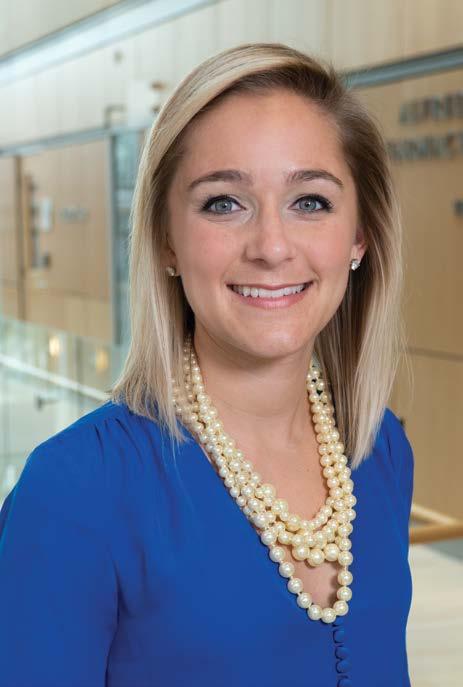
William Tabak, BSP ’61
If you would like to make a memorial gift, please use the enclosed giving envelope or call 410-706-5893.
Nancy L. Taylor, BSP ’62
Fadekemi M. Tinubu, PharmD ’02
Elliot S. Tokar, BSP ’60
Charles H. Tregoe, BSP ’59
Sylvia M. Vlecides, BSP ’65
Frederick H. Wagner, BSP ’57, MS ’67
C. Robert Welsh, BSP ’55
Donald W. Wolff, BSP ’62
William Yeboah, PharmD ’00
Walter C. Zajac, BSP ’54
Gene G. Zepp, BSP ’48
1969
G. Lawrence “Larry” Hogue, BSP, was named honorary president of the Maryland Pharmacists Association (MPhA).
Donald Taylor, BSP, RPh, received MPhA’s Seidman Distinguished Achievement Award.
1976
John Gregory, BSP, DPS (Hon.) ’02, board chair and CEO of Gregory Pharmaceutical Holdings, Inc., who also founded King Pharmaceuticals, received a University of Maryland, Baltimore Catalyst for Excellence Award.
1980
Alan Lyles, BSP, received an honorary PhD from the University of Helsinki.
2000
Jennifer Evans, PharmD, started a new position as director of education programs and grants at the Academy of Managed Care Pharmacy.
2006
Brian Hose, PharmD, has been named CEO of EPIC Pharmacies.
2007
Soumi Saha, PharmD, was promoted to senior vice president of government affairs at Premier Inc.
2010
Mohamed A. Mohamed, PharmD, received the Dr. Frances O. Kelsey Drug Safety Excellence Award from the U.S. Food and Drug Administration (FDA).
2011
Ashley Moody, PharmD, was recognized as the 2022-2023 Mullan Distinguished Teacher by Notre Dame of Maryland University and received the 2023 MPhA Mentor Award.
2012
Marci Strauss, PharmD, started a new position as director of clinical operations at MDI Health and was named the 20232024 president of MPhA.
2013
Larren Suh, PharmD, started a new position as 340B coordinator at CedarsSinai Medical Center.
2014
Michelle Campbell, PhD, started a new position at the FDA as associate director of stakeholder engagement and clinical outcomes in the Office of Neuroscience.
2017
Mehmet Burcu, PhD, started a new position as senior director at Merck.
Lindsay Czuba, PhD, started a new position as assistant professor in the Department of Pharmaceutical Sciences at the University of Kentucky.
Elissa King, PharmD, obtained the Mental Health First Aid certification from the National Council for Mental Wellbeing.
Krina Mehta, MS, started a new position as director of pharmacometrics at Kyowa Kirin.
2022
Martin Calabrese, PhD, joined the Centers for Medicare and Medicaid Services’ Medicare Drug Rebate and Negotiations Group in the Division of Data Assessment and Analytics.
Piper Lindeen, MS, started a new position as corporate development manager at Americans for Safe Access.
Alexander Stojadinovic, MS, has been named chief medical officer of LumaBridge, an oncology research organization that provides innovative solutions to clinical trials.
2023
Sung Jin "Julie" Jeong, PharmD, received the MPhA Outstanding Student Pharmacists Achievement Award.
Jennifer Miller-Wolf, PharmD ’20 President
Catherine Cooke, MS ’18 President-elect
Daniel Mansour, PharmD ’06 Past president
Carla Cobbs, PharmD ’12 Secretary
Andrew Lee, PharmD ’20 Treasurer
Members at Large
Remy Alvarez, MS ’21
James Bresette, PharmD ’97
Michelle Cho, PharmD ’06
Jasmine Ebron, PharmD ’16
Brian Ennis, PharmD ’20
Amy Howard, PharmD ’17
Gwendolyn Lee, MS ’22
HongZhuo Lin, PharmD ’18
Magaly Rodriguez de Bittner, PharmD ’83
Chioma Simon-Ebughu, PharmD ’20
Scott Steiner, MS ’22
Tricia Wideman, MS ’22
“Those who say it can't be done are usually interrupted by others doing it.”
— James BaldwinIt is more than the inevitable passing of an era here at the University of Maryland School of Pharmacy. Dean Natalie D. Eddington, PhD ’89, FAAPS, FCP, stepped down at the end of May, returning to her faculty position and taking on other impactful responsibilities at the University of Maryland, Baltimore.
As one of the oldest schools of pharmacy in the nation, dating to 1841, our School has a remarkable lineage of deans. With Dean Eddington’s 15 years of leadership and stewardship at the helm of the School ending, we note with unyielding gratitude her commitment, sacrifice, and loyalty to the institution. The story of our School continued to be one of expertise, influence, and impact on the nation’s health care system under her leadership.
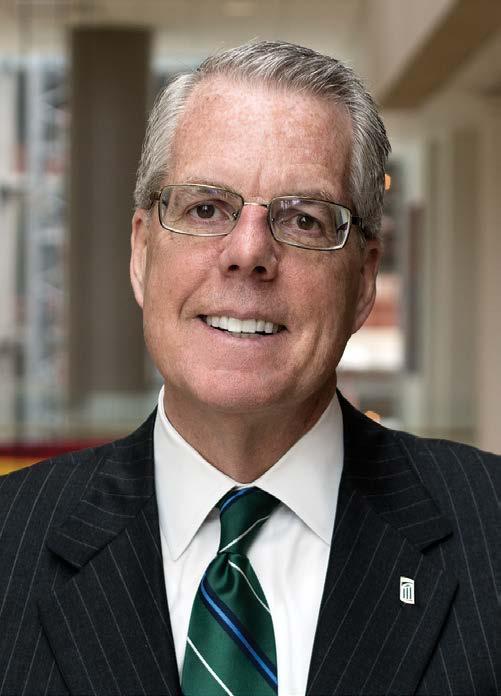
Dean Eddington has introduced and supported many new programs, initiatives, and advancements (far too many to list here) to the benefit of the School, our students, faculty, staff, alumni, and partners. Through her work, she has modeled Pharmapreneurship™ long before this phrase was coined. It is fitting that the School of Pharmacy today serves as the exclusive home of pharmapreneurship, and our legacy from David Stewart, Louis Dohme, and B. Olive Cole to William J. Kinnard Jr., David A. Knapp, and Natalie D. Eddington continues its enviable trajectory.
Tomorrow is bright thanks to the efforts of those who have come before us. Dean Eddington has protected our history, strengthened our reputation, and laid the seeds to ensure the success of the next generation of graduates. It was a remarkable 15-year journey for the School under her leadership.
If you wish to join us in honoring and thanking Dean Eddington, please consider making a gift in her name to the Dean’s Fund at the School of Pharmacy at pharmacy.umaryland.edu/ go/capsule or mailing a check made to the UMB Foundation to:
Office of Gift Administration
220 N. Arch Street, 13th Floor Baltimore, MD 21201
Thank you,
Ken Boyden, JD, EdD Associate Dean, Office of Development and Alumni Affairs410-706-4415 | kboyden@rx.umaryland.edu

